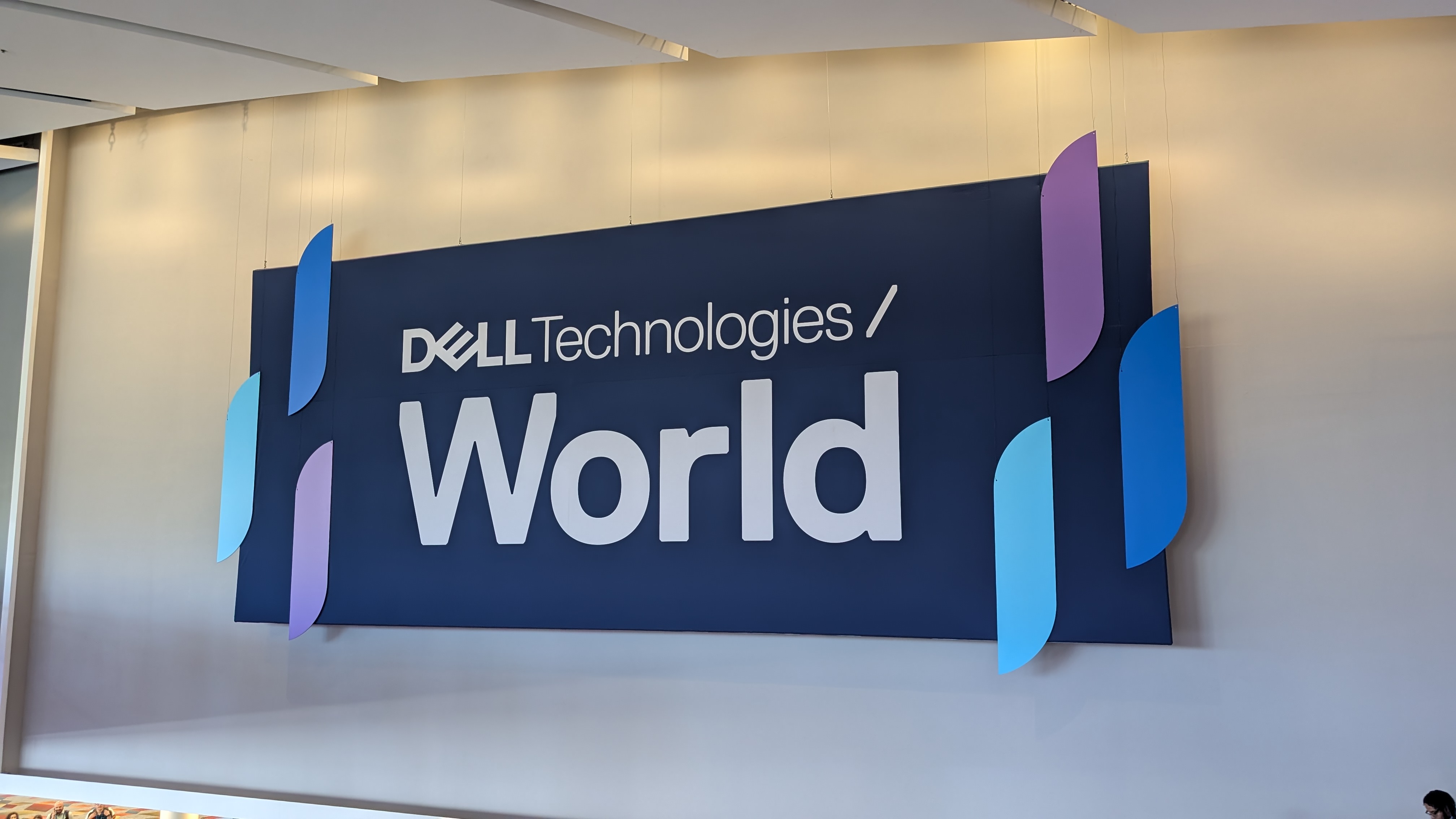
Hello and welcome to our coverage of Dell Technologies World 2025.
This year's event was packed full of announcements and news, with two huge keynotes alongside some very special guests.
If you missed any of the news or updates, never fear - you can read it all below!
Good morning from sunny Las Vegas!
TechRadar Pro is here and all set for Dell Technologies World 2025, which is set to kick off tomorrow, so check back then!
Good morning from day one of Dell Technologies World 2025!
We're heading down to breakfast before today's keynote, starting at 10am PT/1pm ET/6pm BST.
Hosting this morning is Michael Dell, Chairman & CEO, Dell Technologies, who is set to be joined on stage by some very high-profile guests...
Badge secured! This is our passport to all the biggest talks and keynotes this week...as well as the press lounge and it's delectable array of pastries and coffee.
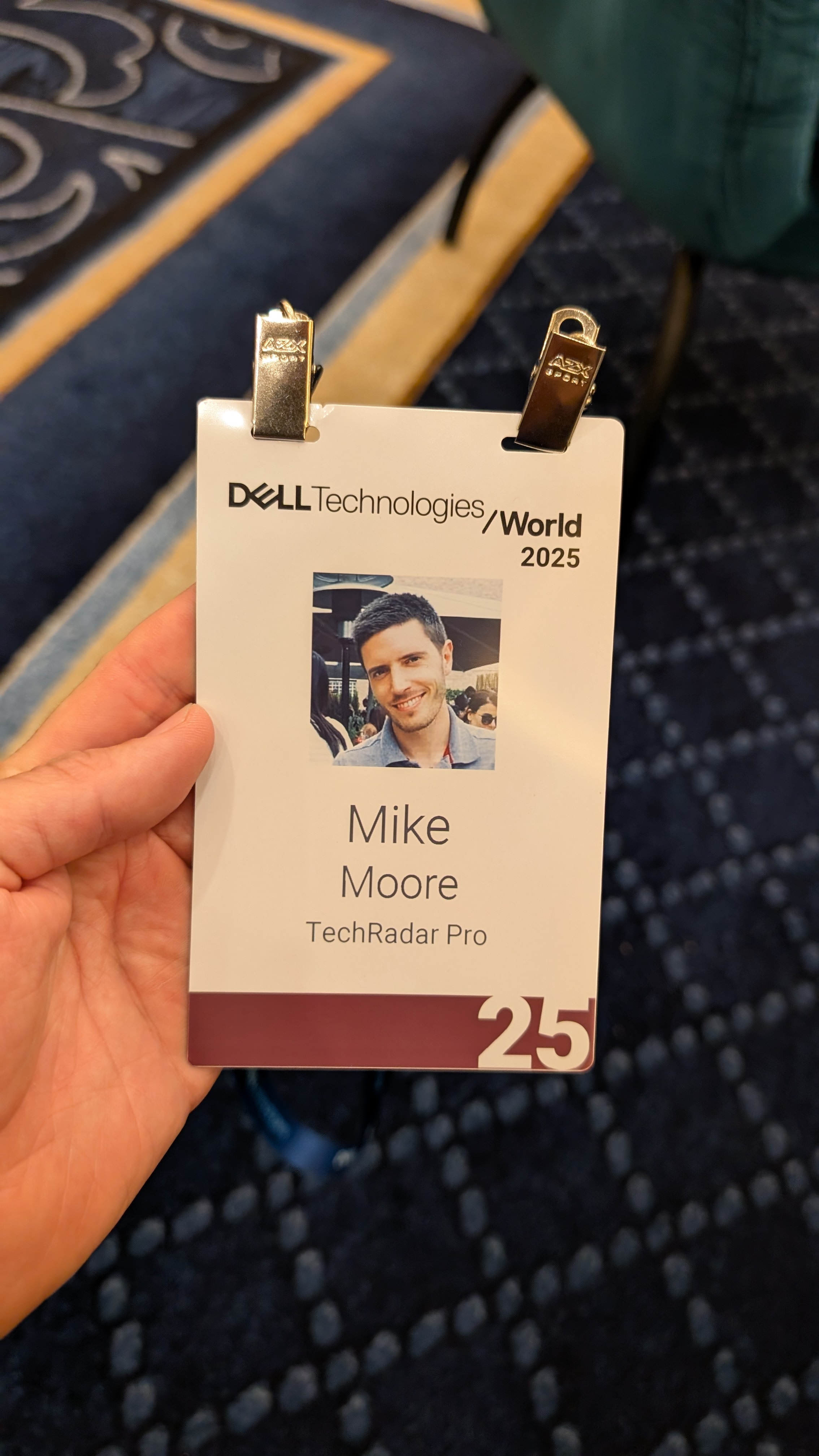
We're in and seated - as usual for Las Vegas keynotes, we're immediatey bombarded by loud music, this time by a rock group playing covers of your favorite hits.
Chappel Roan's "Pink Pony Club" is a bit of an odd choice for 9.30am though...
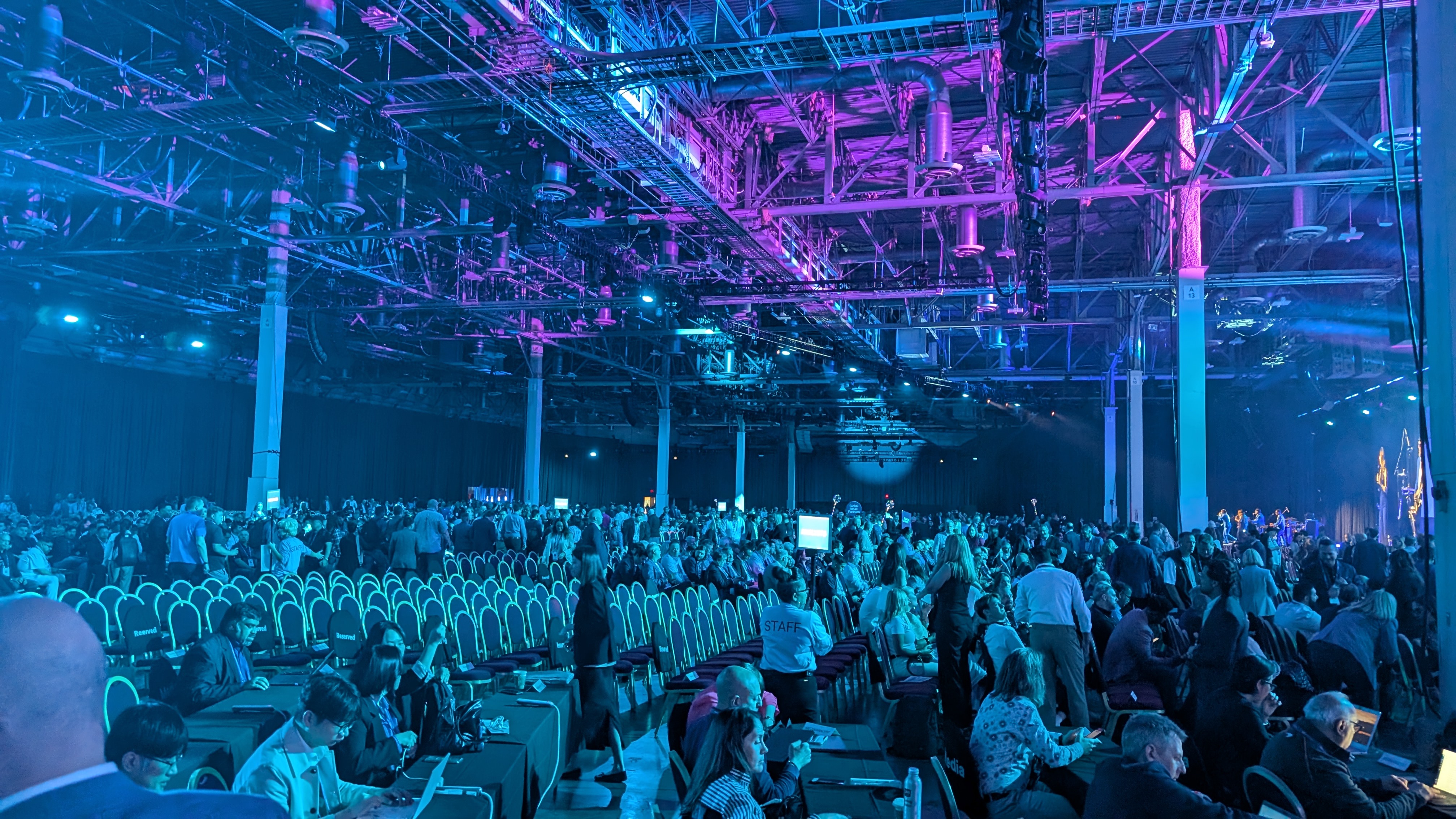
The music is cut off (mid-way through a triumphant finale of Bohemian Rhapsody) and it's time to kick off Dell Technologies World 2025 - with a video highlighting some of the biggest innovations and updates from the company.
The lights go down and Michael Dell, Chairman and CEO of Dell Technologies, takes to the stage.
He welcomes us to "Dell Technologies Way" - a street that's alive with our energy, creativity and data.
"Data is at the center of everything, everywhere, all the time," he notes, with most of this produced at the edge, where AI thrives.
"The future of AI will be decentralized...and that's why Dell is pioneering the edge AI revolution," he adds.
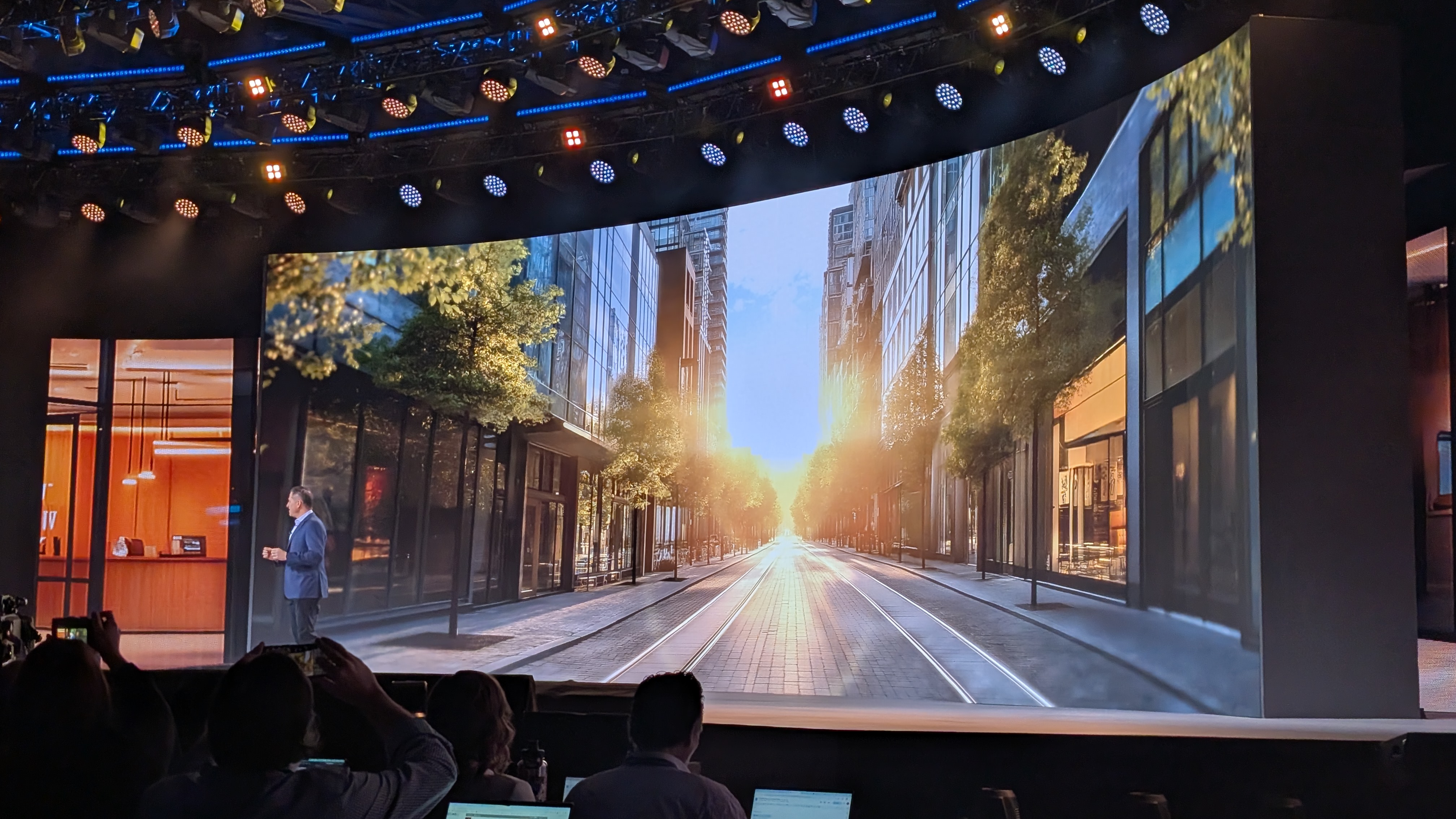
"Here at Dell, we love data...and turbocharged by AI, that engine of progress is going faster than ever before," he adds.
He mentions the "AI Factory" - Dell's system designed to help companies of all sizes get the most out of AI.
"AI can power your progress," Dell adds, noting that all companies should be able to benefit.
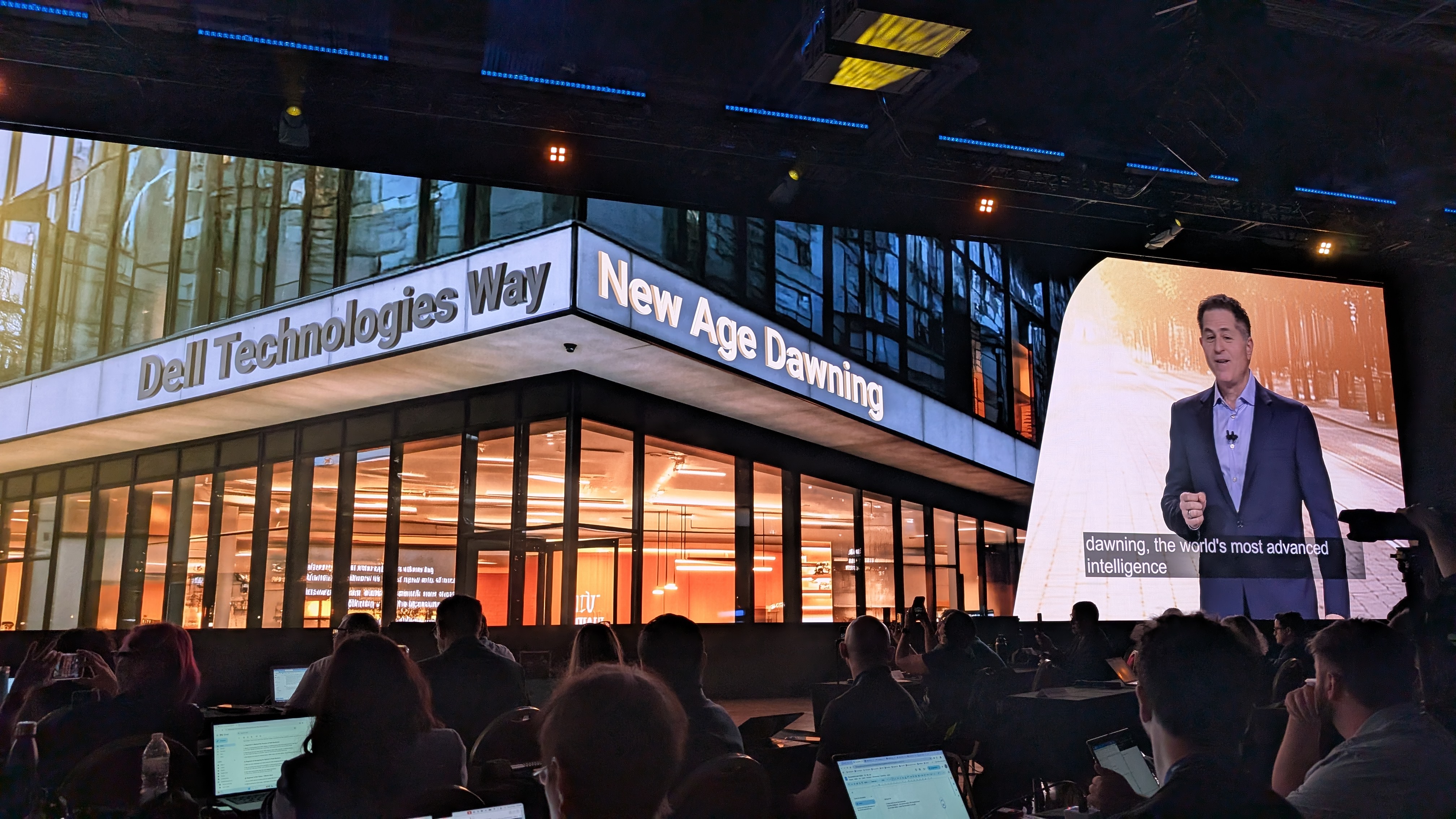
Dell moves on to highlight that it's OK to be overwhelmed by the sheer amount of potential AI offers.
"The real danger is staying still," he declares.
It's time for our first guest - Larry Feinsmith, Head of Global Technology Strategy, Innovation & Partnerships, JPMorganChase.
He notes Dell and JPMorganChase have been partners for over 30 years, and as it handles billions of transactions per day, needs a technology platform it can rely on.
"We firmly believe technology is a differentiator," Feinsmith notes.
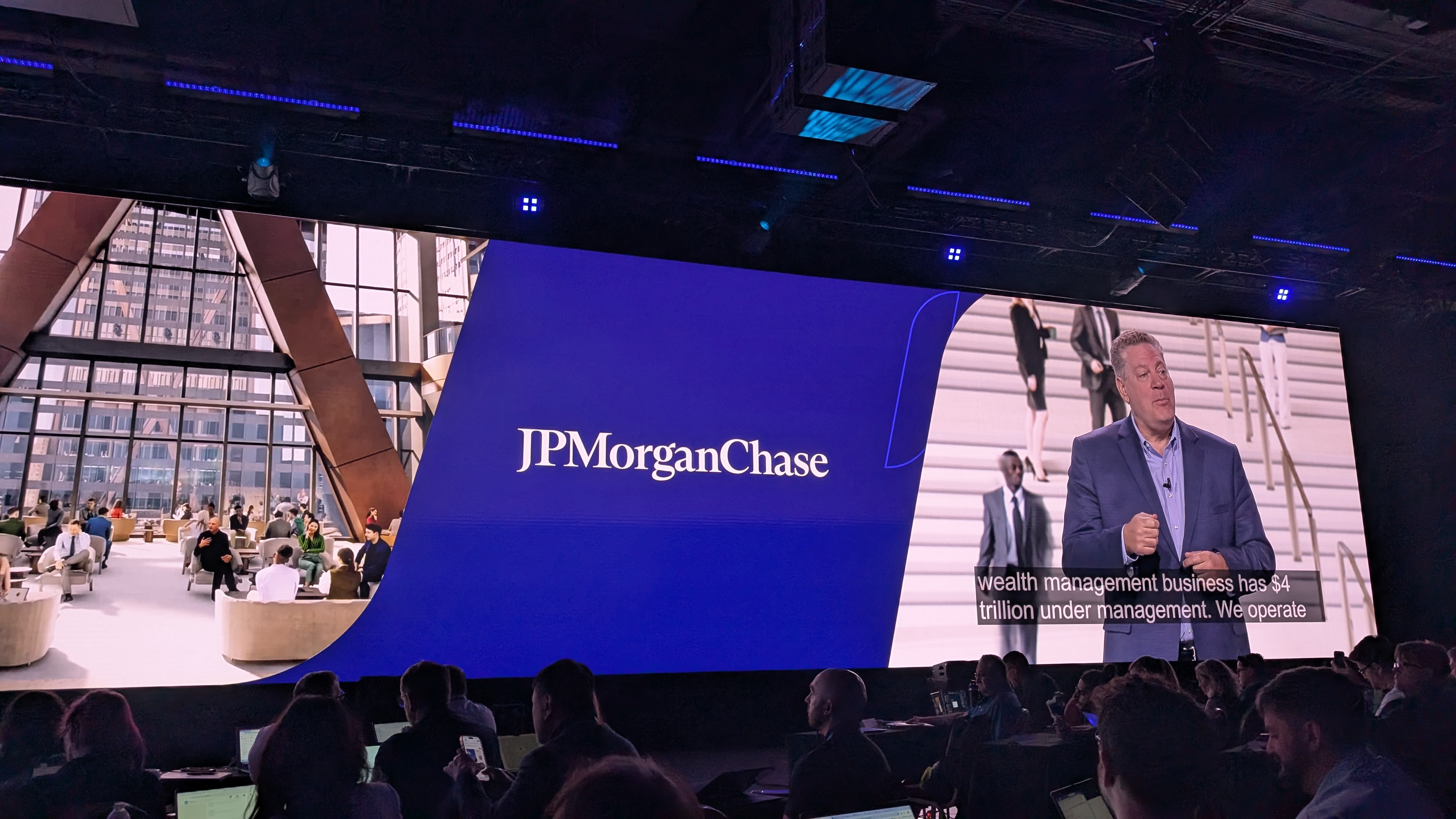
We bid farewell to our guest, and Dell switches to talking about the company's backbone - the PC.
AI innovations are replacing aging technology - namely, Windows 10 - and Dell is ready to help power the next generation of productivity.
Laptops are becoming AI worksations, Dell notes, inckuding the new Dell Pro Max with Nvidia GB300 - offering a ridiculous amount of power under your desk.
"AI is moving out of the cloud, onto the edge, bringing intelligence to every device in real time," he notes.
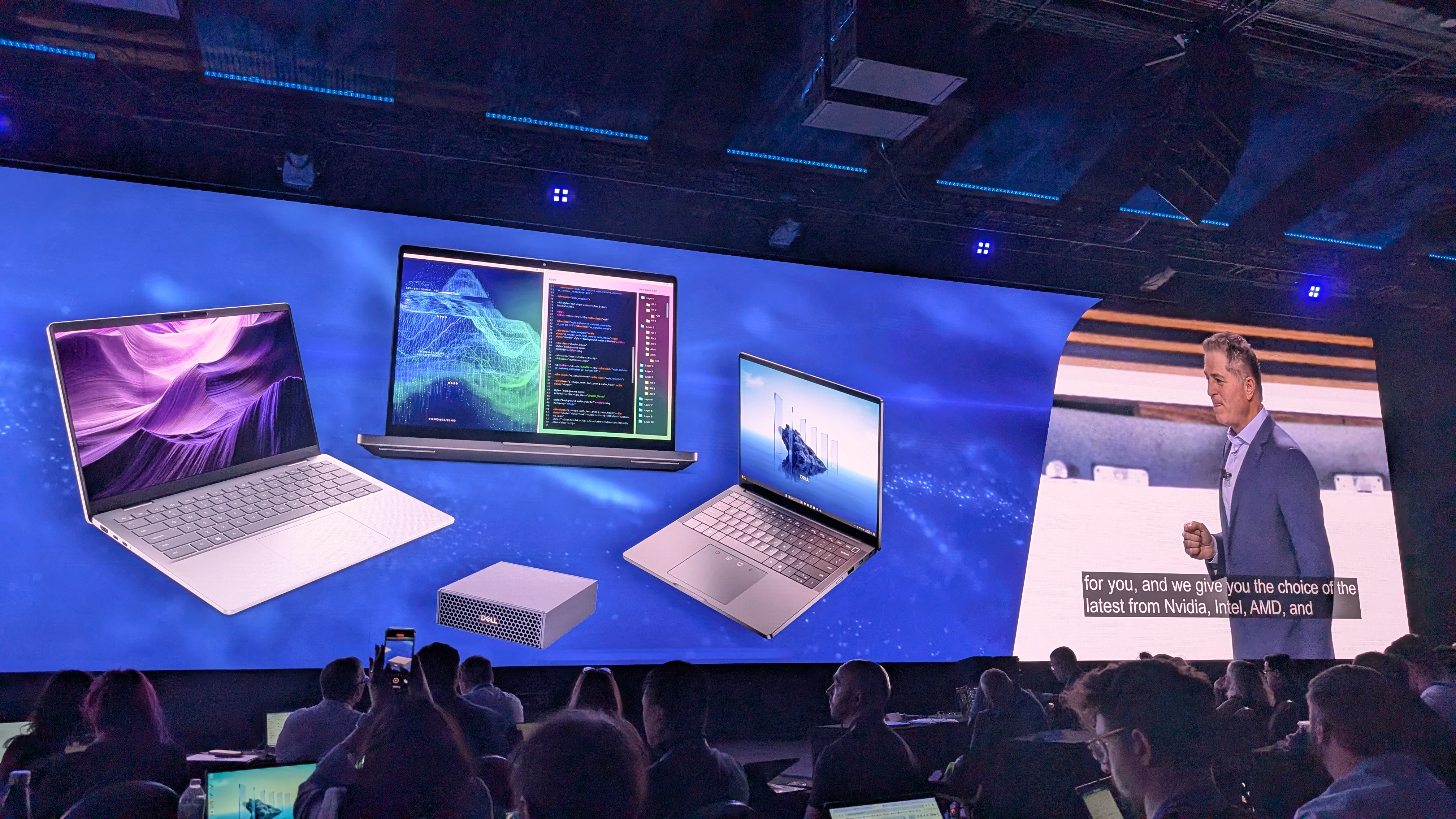
We swiftly move on to compute and infrastructure - Dell wants to be the hardware powering all your workloads.
Storage is a huge focys for the company - namely PowerStore, the perfect choice for disaggregated architecture, Dell says, helping save capacity, power and space.
PowerScale and PowerProtect also get a shout out - all forming a key part of Dell's overall architecture offerings.
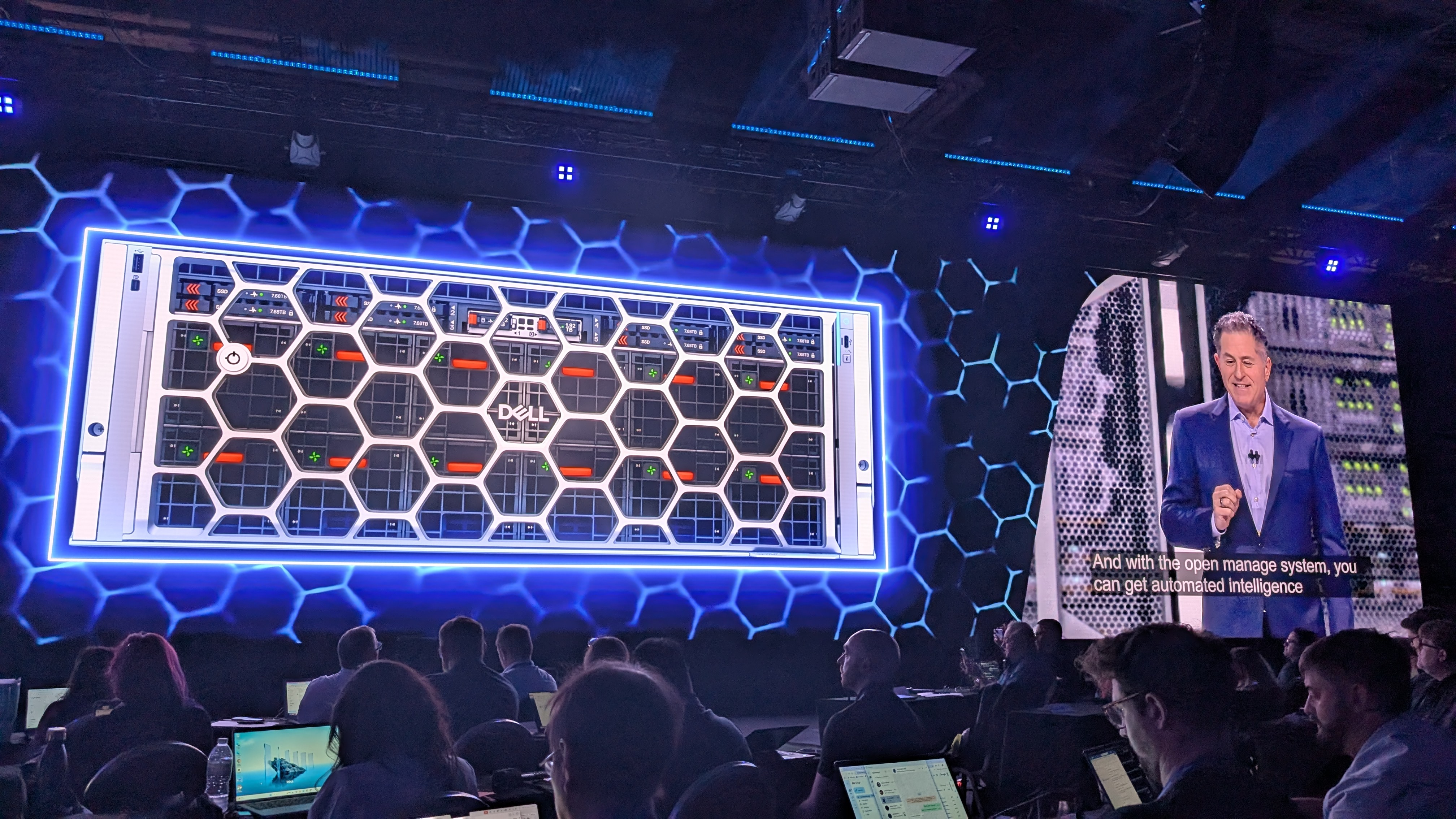
We'll hear more on specific news in the day two keynote tomorrow, Dell teases...
AI Agents are a major focus for businesses everywhere, Dell notes, especially as data moves from cold storage to warm and hot tiers, as multi-agent systems get the most out of it.
Dell has been pushing this for some time, he notes - and with that, it's time to welcome our next guest - Seemantini Godbole, Executive Vice President, Chief Digital & Information Officer, Lowe’s.
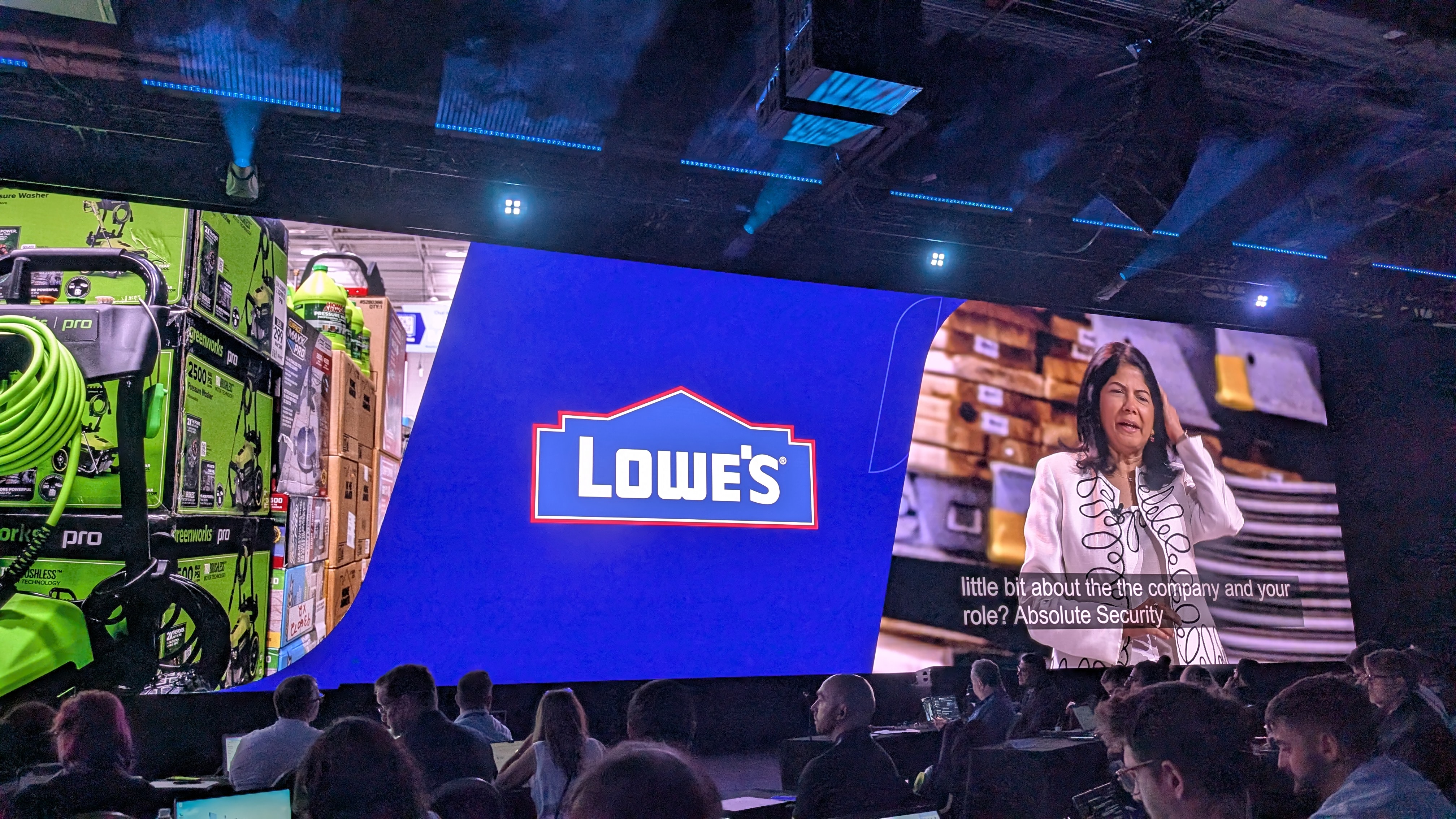
Godbole lays out how a company like Lowe's is not just a home improvement powerhouse, but a technology titan - bringing a whole host of systems and services to help make what can be a stressful process much more seamless for customers.
Next up, Dell switches to focus on reimagining on how businesses can capture value from their data
"We are entering the age of ubiqutious AI", he says, as AI becomes as commonplace as electricity.
However this doesn't mean AI is here to replace human workers, he notes.
It's time to look at the Dell AI Factory - the full big-picture view of AI from the company.
Dell notes it can be more than 60% more effective than public cloud, and this will only get better as more investment comes in.
"AI is the operating system that will power the world forward," he declares.
The challenge now is making AI more accessible to customers, he says.
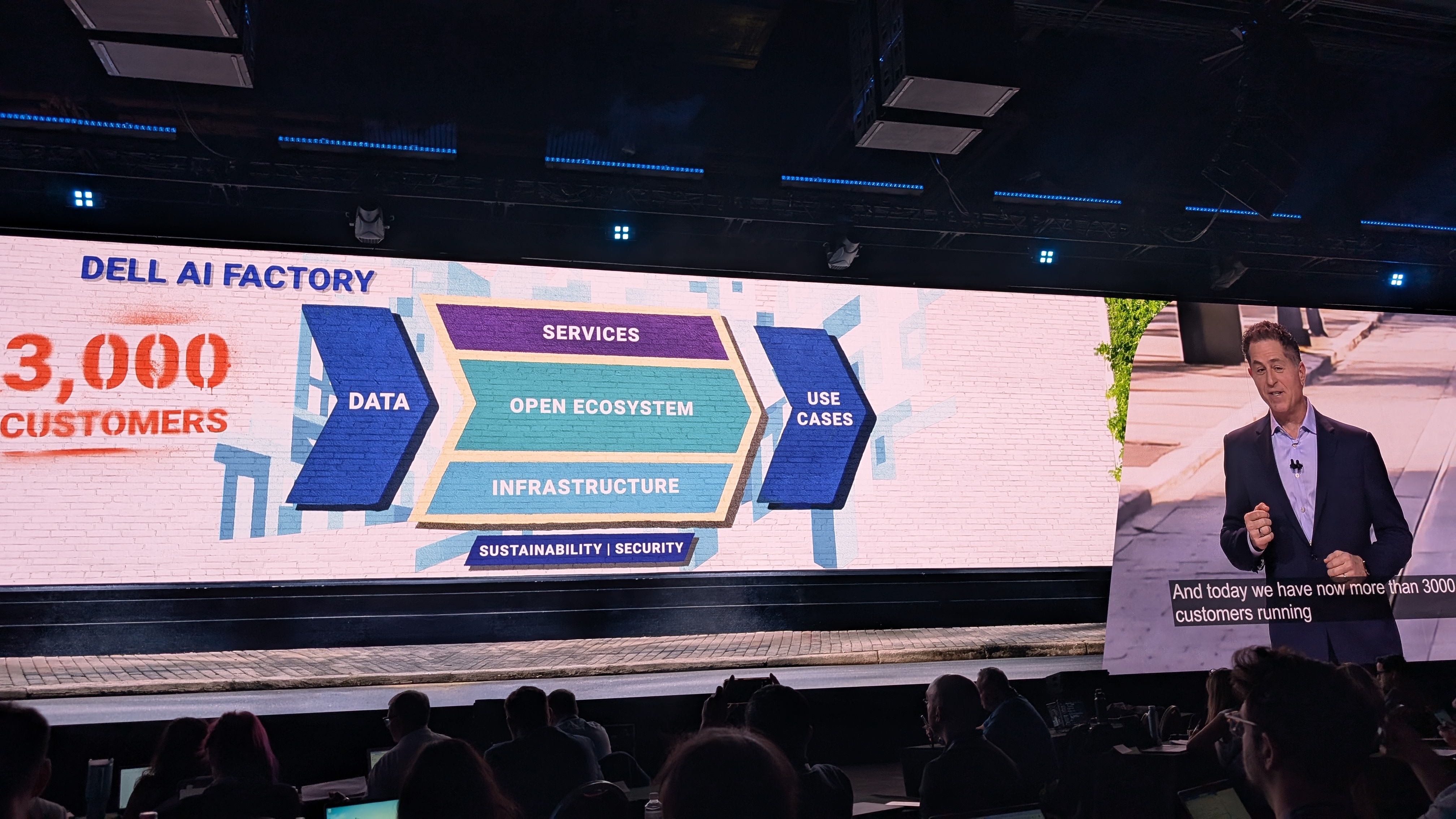
"We are on the cusp of an intelligence explosion," he notes - and working with Nvidia is the key.
The companies are unveiling version 2 of the Dell-Nvidia AI Factory, offering some hugely advanced hardware, along with a new cooling system designed to take some of the strain off the system.
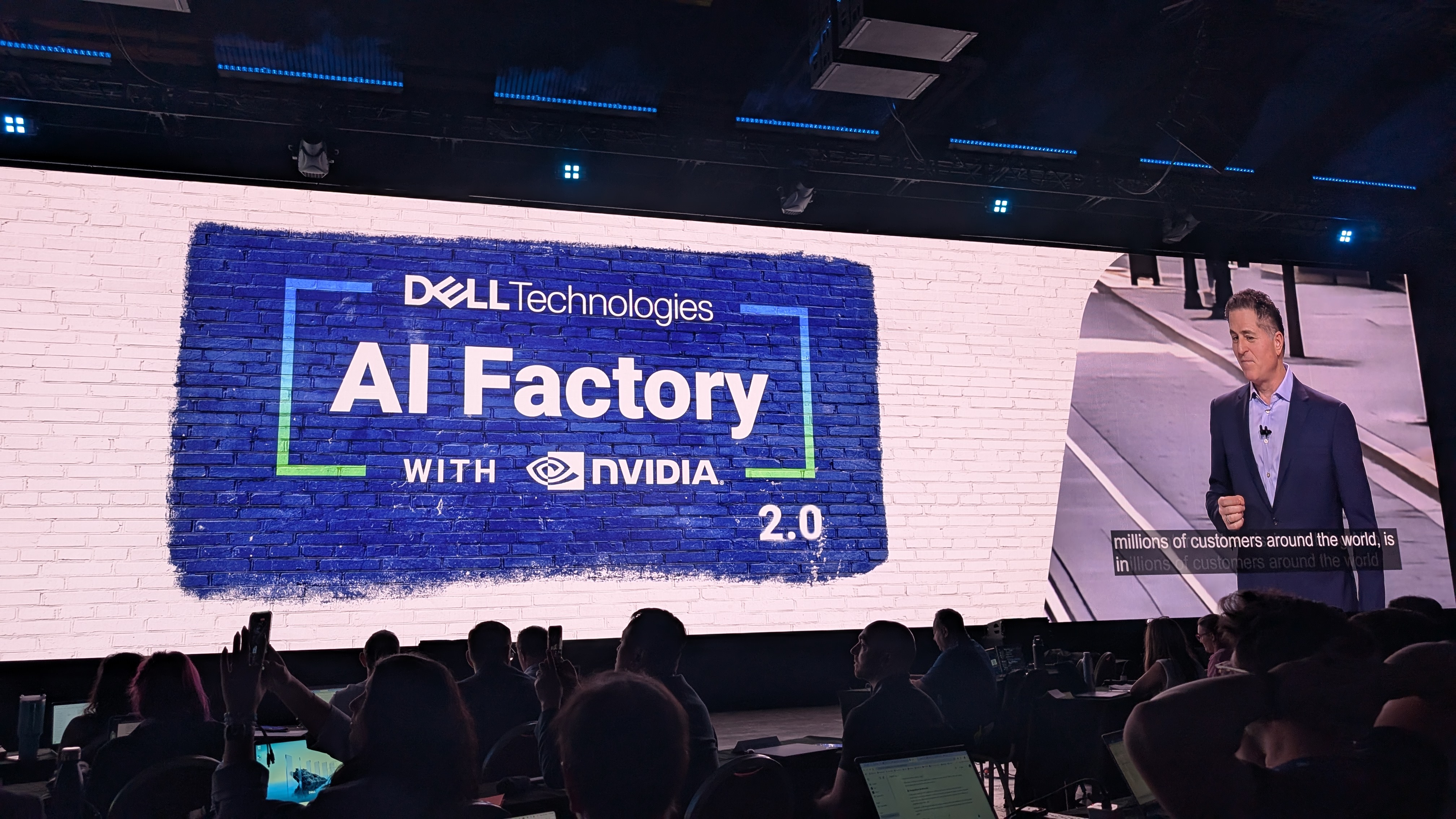
Dell managed services are also expanding across more Nvidia platforms, allowing users to manage the entire AI lifecycle.
Our next and final guest is one of the biggest names in tech right now - fresh from Computex, it's leather jacket aficionado, and Nvidia founder and CEO Jensen Huang.
Sadly - it's only by video, as Dell sat down with Huang prior to the show.
Huang notes how Nvidia is queuing up for the huge potential offered by enterprise AI, particularly when it comes to agents, as well as the innovation provided by Dell's AI Factory.
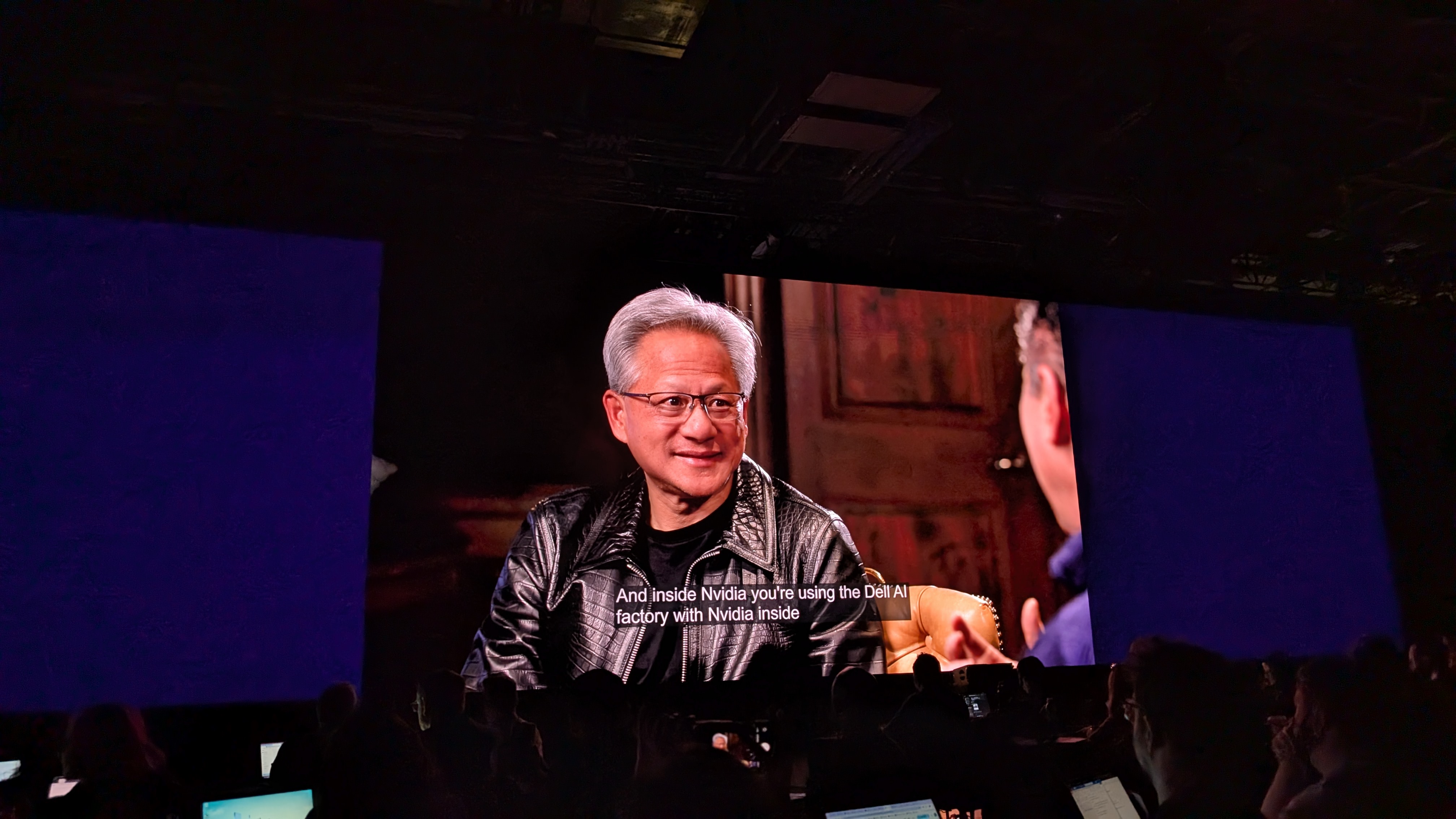
"This is unquestionably the biggest platform shift" of the last 30 years, Huang notes - many systems were built in the old age, and now need to be brought into the age of AI.
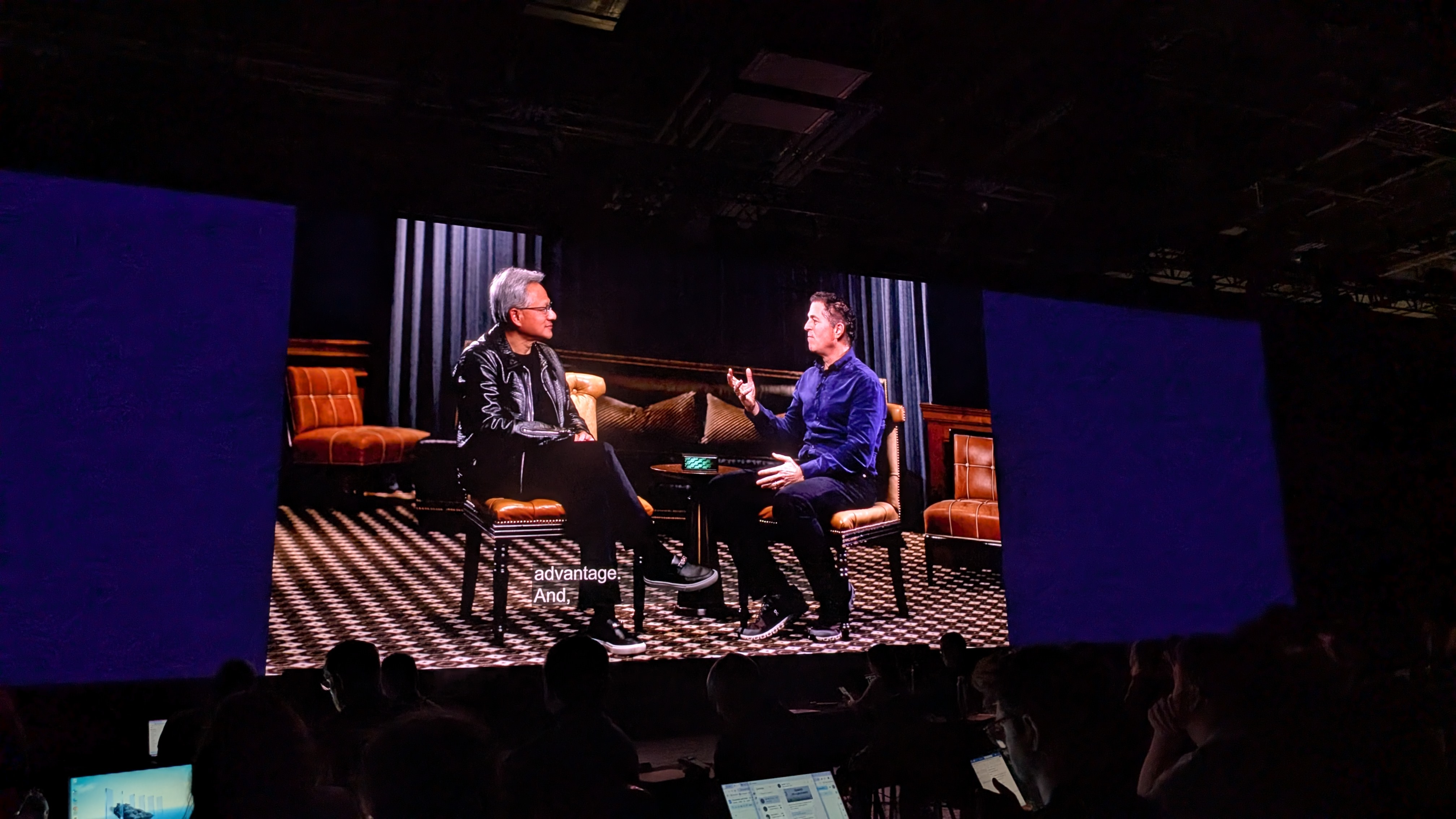
"This is a once in a lifetime opportunity...this is incredibly exciting technology," Huang concludes, "this is the beginning of a decade of transformation."
Dell is back to wrap up, highlighting the importance of relationships in business, especially when it comes to living up to your commitments.
He also highlights the commitment to green initiatives and energy, with new Dell products and services coming out to help boost efficiency, as well as initiatives to reclaim and re-use older components and products.
"For us to realise the potential of AI, we need to do it responsibly," he notes.
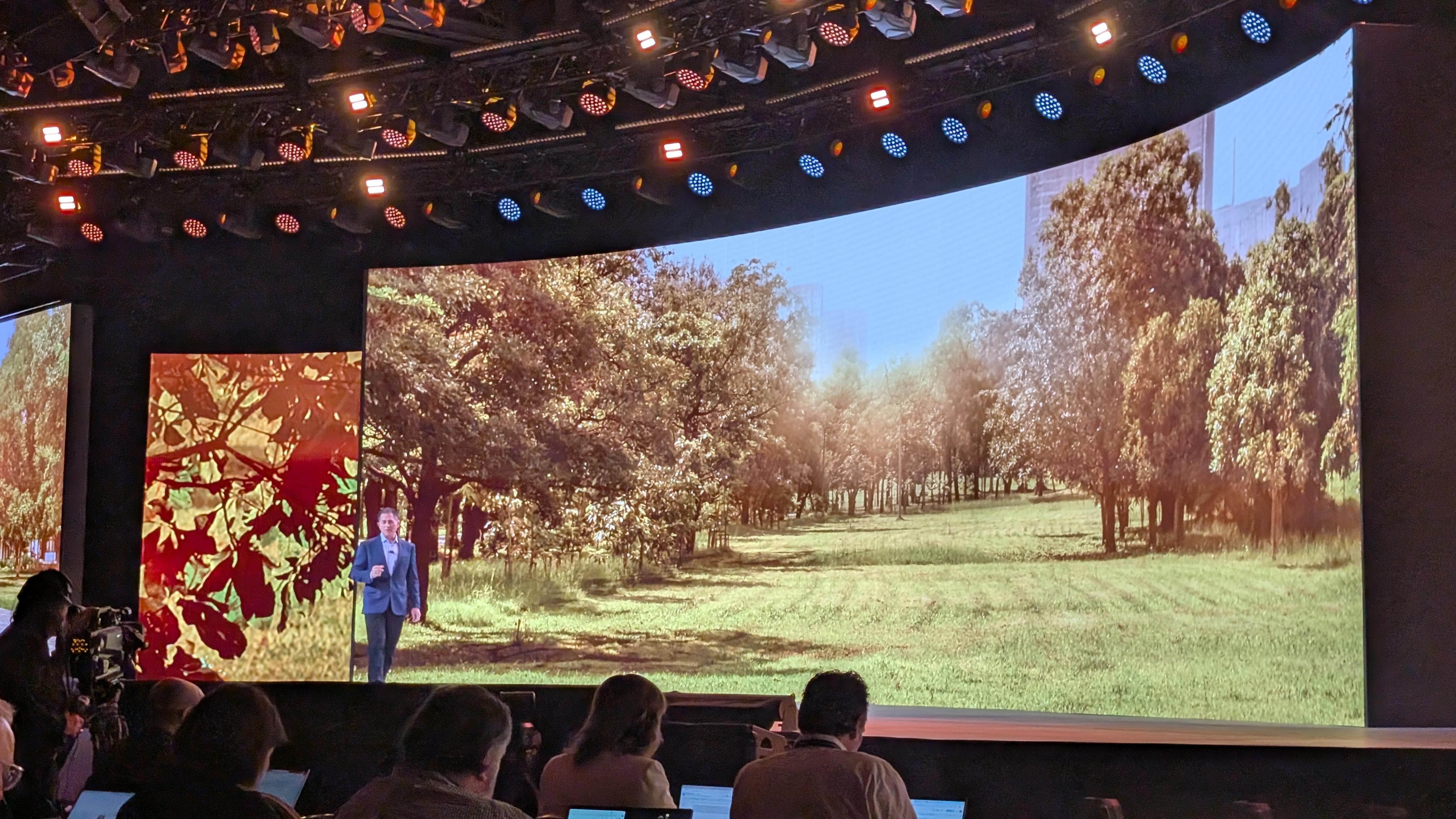
"AI is for all of us - it's for all of human progress," Dell notes.
"AI is the new electricity - and Dell is the grid powering this transformation," Dell declares.
"At our core, we're about solving the world's toughest problems."
And that's a wrap on the opening keynote from Dell Technologies World 2025! Dell thanks us for coming, and we're off to hit the show floor for a look around.
We'll be back shortly with more coverage of press and media panels, so stay tuned for more updates soon.
So what happened at Michael Dell's opening keynote this morning?
The company founder and CEO Michael Dell was in bullish mood talking about its AI goals, saying the technology is "the new electricity".
Dell also declared the company was ready to take on the increased demand for PCs following the Windows 10 End of Life in October 2025, pitching AI PCs as the future for businesses everywhere.
Next up is a press roundtable, focussing on energy and AI, hosted by Tim Shedd, Dell Engineering Technologist and David Holmes, CTO for Global Industries.
After introductions, Holmes starts off by outlining how Dell's approach to working with energy companies has changed significantly in the past few years, especially as AI demand continues to rise.
Building and deploying huge amounts of AI infrastructure without impacting the grid is a key concern, he notes.
Holmes adds he meets with energy firm executives regularly, and their biggest challenges are permitting and a stable regulatory environment.
Both of these are crucial given the scale of the possible investment asked of the energy providers, which can potentially span multiple decades, he says.
We need to think hard about how we unleash AI, whilst staying supportive of sustainability.
Energy grids have previously been build on the supply angle, he notes - this is not the case as much now, and managing the demand and load being put on the grid is becoming an increasing worry.
Data center providers can also play their part, Holmes adds - partnerships are, "absolutely key to success".
Asked about the challenges, opportunities and learnings, Shedd notes power cooling technology can be a huge advantage moving forward.
Starting from the chip, to the rack, to the row, up to the data center, heat needs to be considered at each stage, he says, meaning a 1% improvement at any stage can roll in to big opportunities as a whole.
The more efficiently heat is collected, the easier it is to reject the heat outside of the building.
When it comes to learnings, Shedd notes that working together with customers, and listening to them to learn their needs, is vital.
"Every deployment is unique," he says.
Where Dell really excels is deployment and field services, he adds, deploying the technology at scale, and quickly.
Time for Q&A - first up, how does Dell deal with the potential over-hype when it comes to generative AI?
Holmes counters by saying there are "profound applications of Gen AI" that are changing how organizations do business.
Shedd adds that while he sees the skepticism, but notes the scale and breadth of Gen AI technology shows how it can be useful for organizations across the board.
The next question concerns workload scheduling in data center- what is its role?
Ty Schmitt, Dell Vice President and Fellow, has joined us, and explains factoring in this functionality at a rack or cluster level has been a huge advantage - although this is often customer-specific.
Next is a question about power expansion - are you building to a GPU, or is it something else?
Shedd notes that although the curve keeps going up, with no end in sight (for the time being at least) - with Dell announcing new rack hardware and cooling services to ensure optimal running.
But not that many customers are building to this kind of scale, he adds - it's very much customer-specific.
Schmitt adds understanding of customer scale and needs is vital - so optimizing for performance per watt is the important thing.
The final question is about local and regional energy production, and how this might affect building or planning new data centers.
Holmes notes once again that partnerships are essential - and providing the balance between the energy available, and the capacity on offer, might be the main point.
With that, it's a wrap here - we'll be back shortly.
Good morning and welcome to day two of Dell Technologies World 2025.
We're well rested and ready for another packed day - first up, an exclusive look at the Dell stand on the show floor, before the day two keynote, which promises to be a cracker.
Stay tuned for the latest updates!
Unsurprisingly, Dell's booth is massive, and split into several areas, each showcasing a different theme the company wants to excel in...
We'll have photos to come shortly, but first, a panel session!
Hosted by John Roese, Dell Technologies CTO and Chief AI Officer, alongside customers from CSX Corporation, Dauntless XR, Fluidstack and Worley, it's going to look at....surprise, surprise, AI!
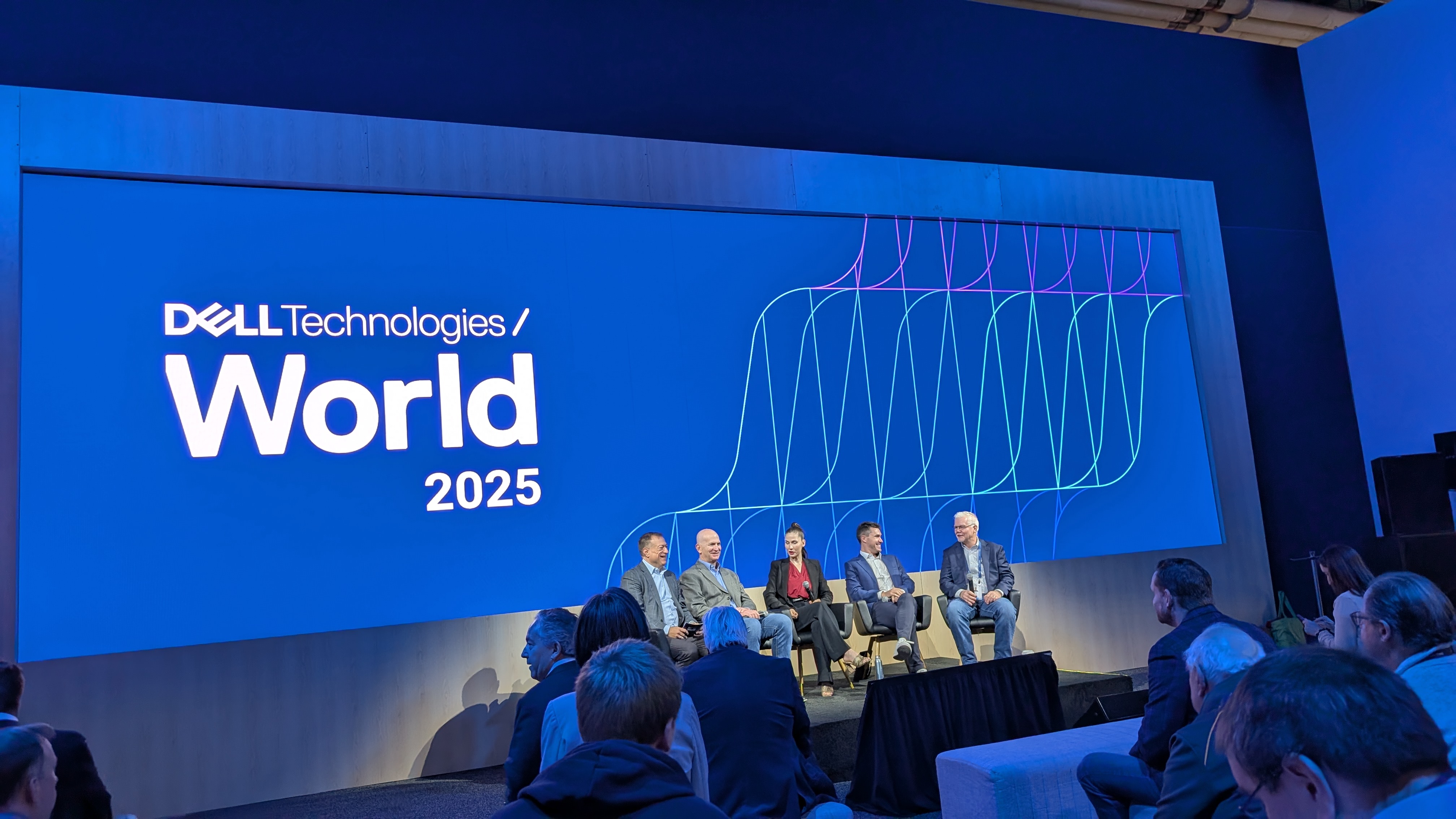
Roese notes that we're now in "year three" of Gen AI, as the technologies and services being developed are now properly reaching maturity - so what effect will this have on companies?
First up - what actually is "enterprise AI"?
Roese notes this term has gone through several iterations over the last few years, so where are we right now?
The consensus seems to be...there isn't much of a consensus! It's clearly AI is being deployed across multiple industries, from safety at a train operator, to developing mixed reality workflows in construction, to deploying the latest coding tools.
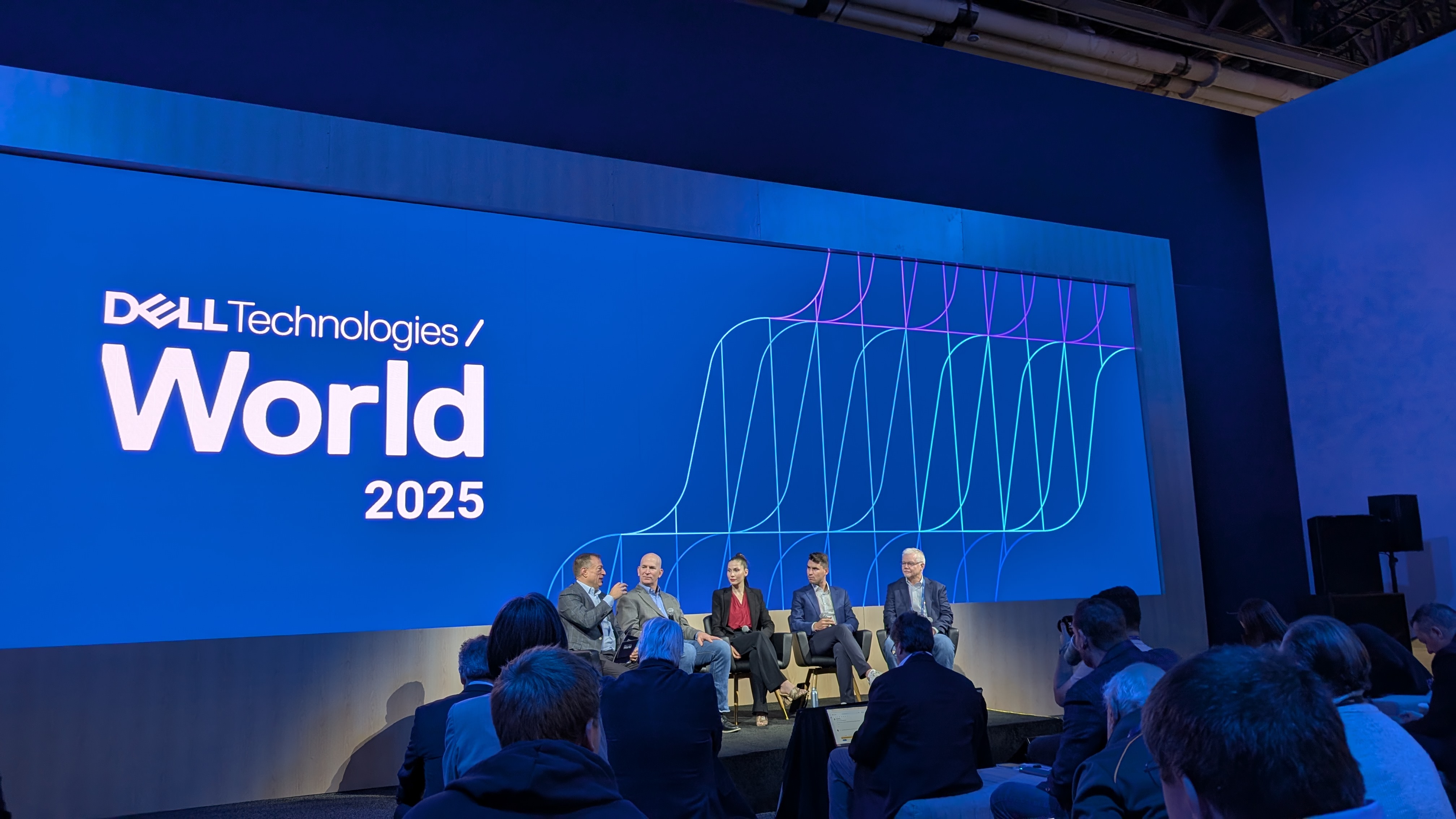
Where do we go next, Roese asks the panel?
The edge is a clear focus for many, allowing for greater control and collection of data - but XR also gets a mention, giving users a different way of accessing their data.
Also raised is boosting productivity via AI agents, and making sure sustainability concerns are addressed.
A quick Q&A - can AI help full in resource and skills gaps?
It's clear there are issues when it comes to such gaps, the panel agrees, especially when it comes to data-heavy tasks or specialized activity.
That's a wrap here - we're off to grab our seat for the second keynote, so will be back shortly!
After a quick dash, we're in and seated for the day two keynote!
Entitled "Innovation in Action", it's set to be hosted by Jeff Clarke, Vice Chairman & Chief Operating Officer, Dell Technologies, and will feature a selection of special guests to talk us through some of the company's newest innovations.
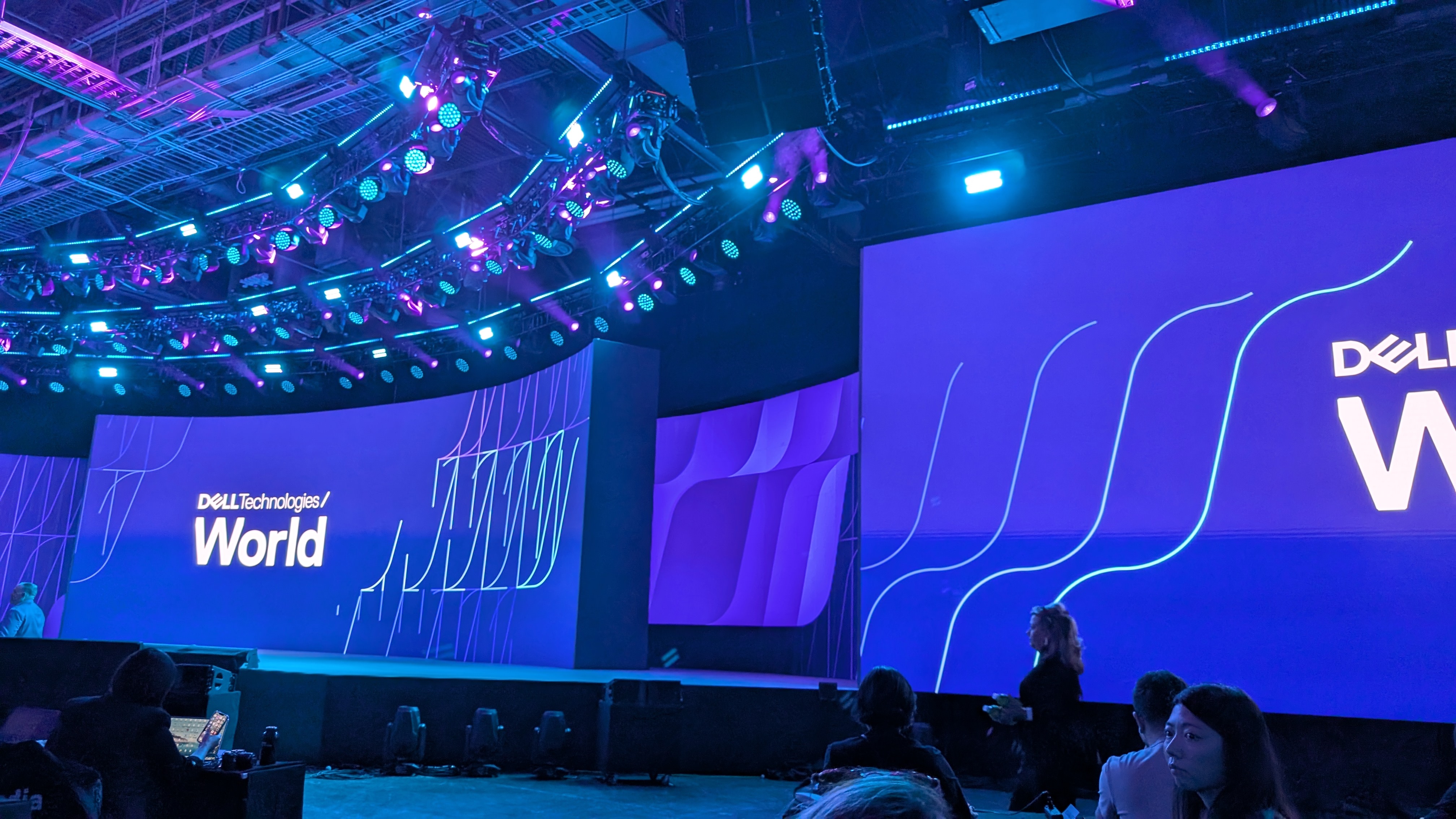
In case you were wondering, this morning's musical entertainment is a (different) rock band, this time blasting out some Led Zeppelin among other rock classics - again, the perfect tonic to waking us all up...
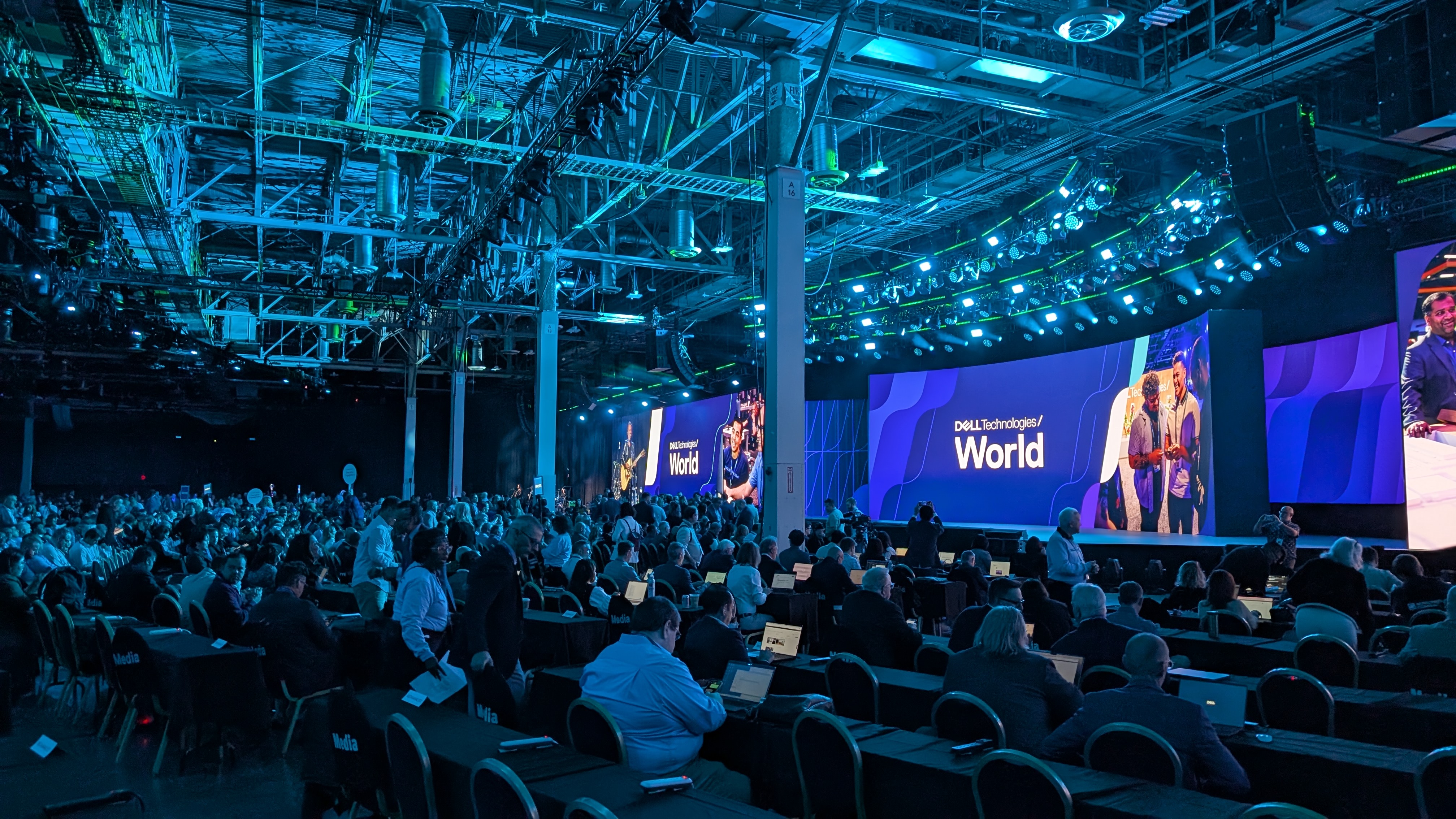
Right, here we go - the lights go up and Jeff Clarke, Vice Chairman & Chief Operating Officer, Dell Technologies, takes to the stage.
This is the day we make things real, Clarke says - especially when it comes to AI.
"Gen AI is only accelerating," he notes, "I've never seen anything like this."
The Capex investment in AI this year alone is more than the Apollo program which put a man on the moon, Clarke notes.
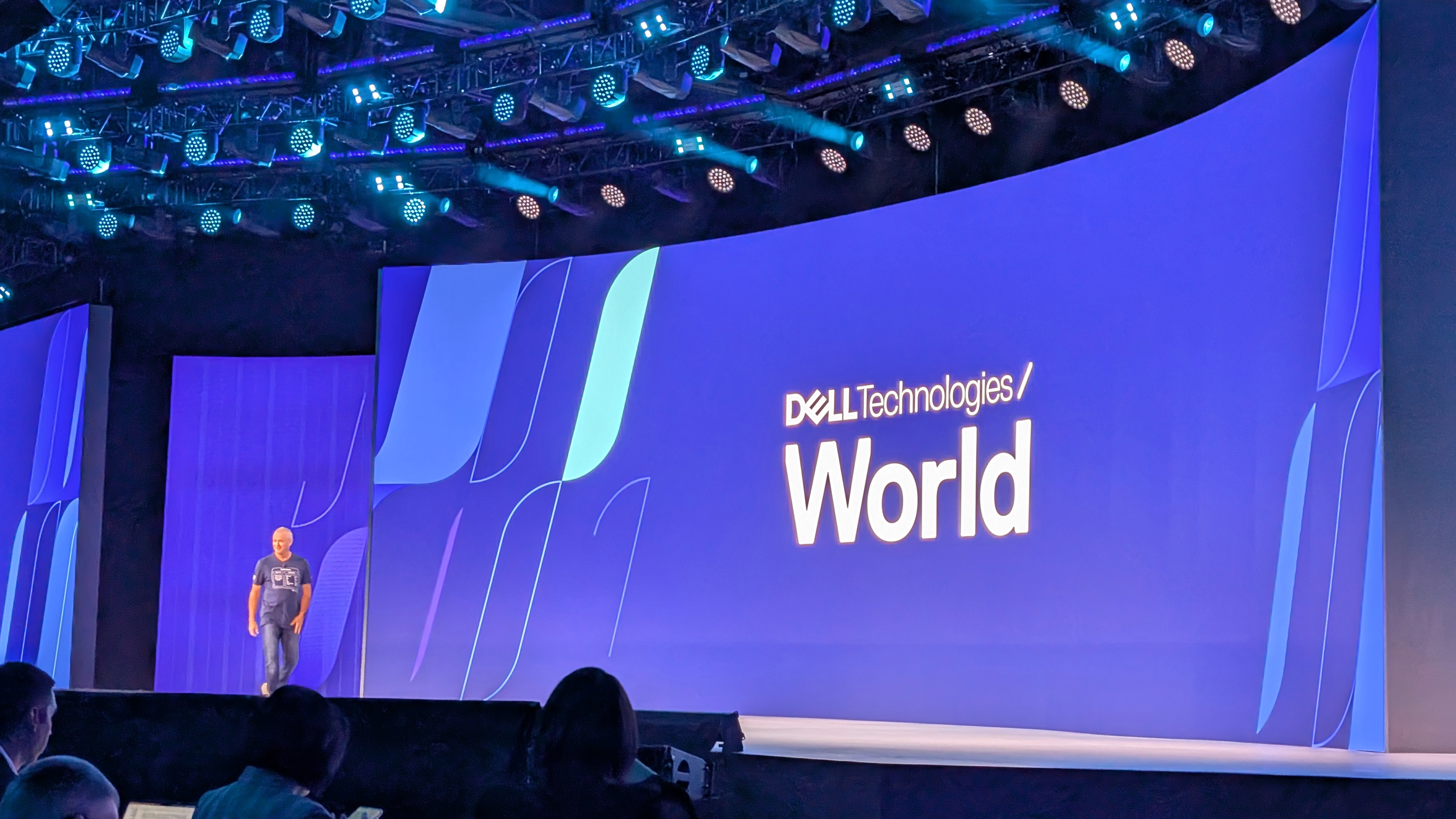
At the core of this is the Dell AI Factory, which combines the company's key features and services to make it the world's "#1 AI infrastructure", Clarke says.
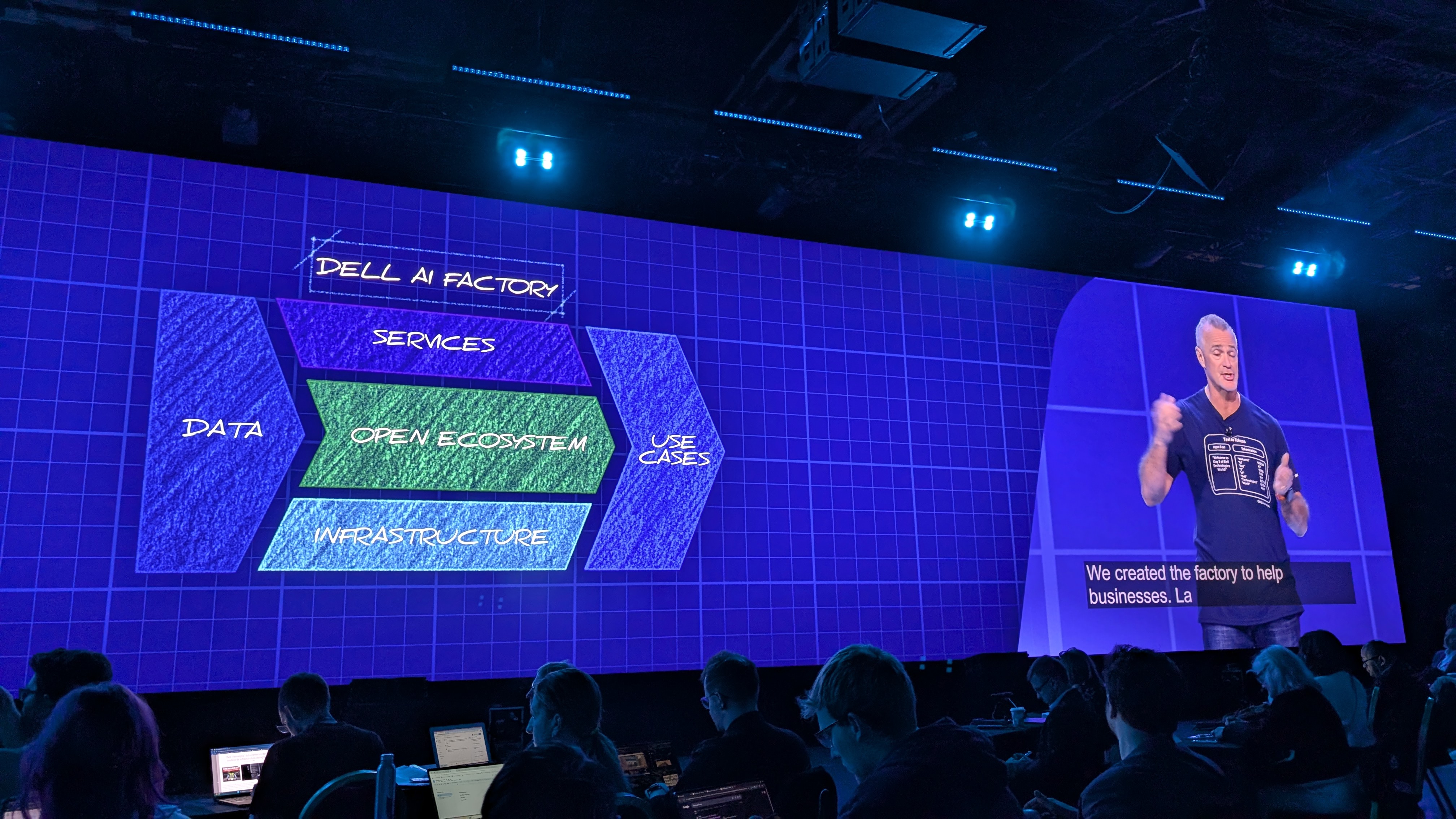
Clarke moves on to show how far Dell has come in just a year - with huge advances in computing power and capabilities across the board, and things are only just getting started.
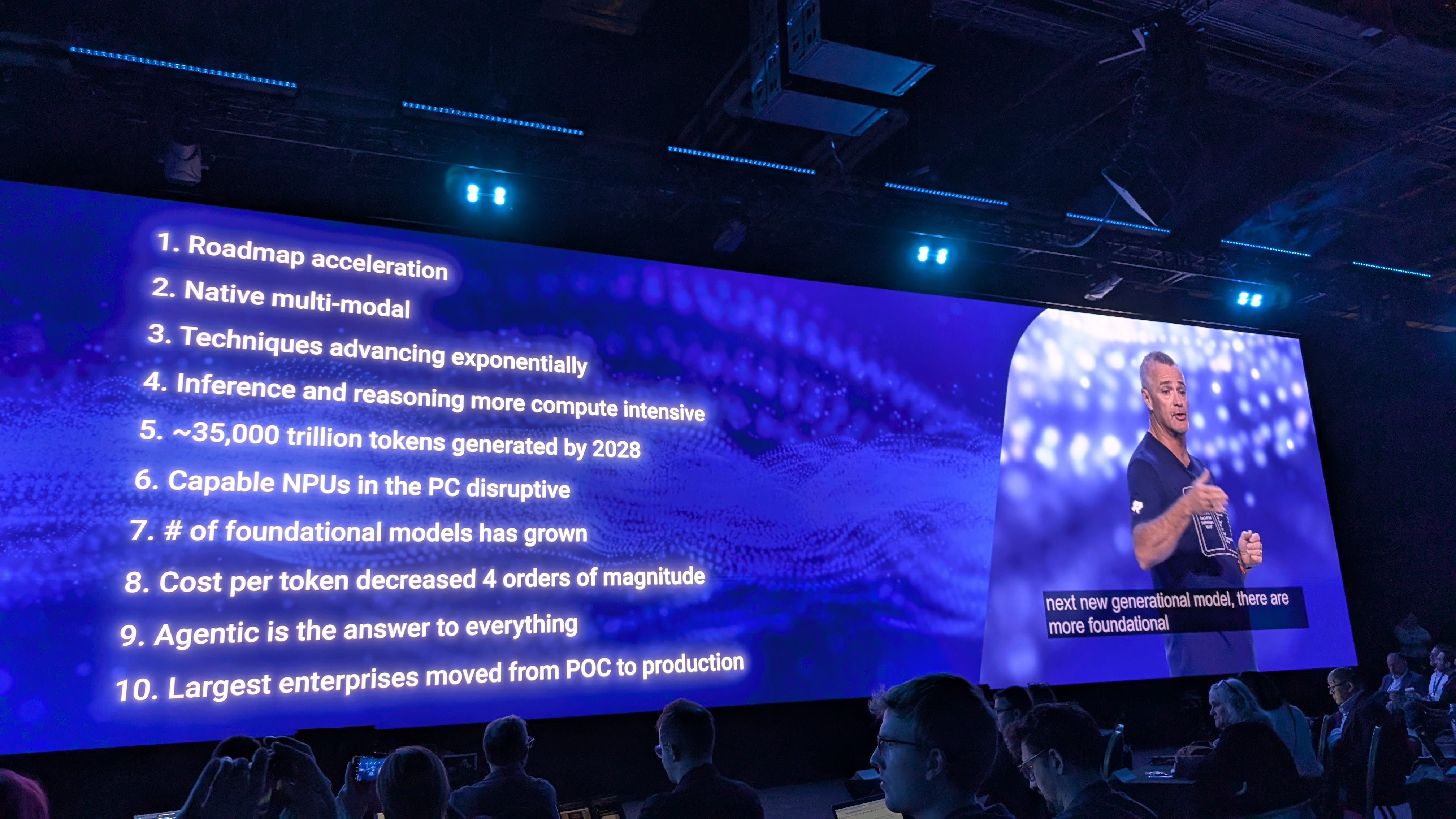
Clarke notes that Dell's customers are moving from a proof-of-concept when it comes to AI, towards actually actioning the work and getting AI to work in their organization.
This is even true within Dell, he adds - outlining how over the past two and a half years, the company has implemented AI within its own business.
"We were all over the place," Clarke laughs - but getting AI to work, especially with governance and methodology, on the vast range of disparate data and projects paid off big time.
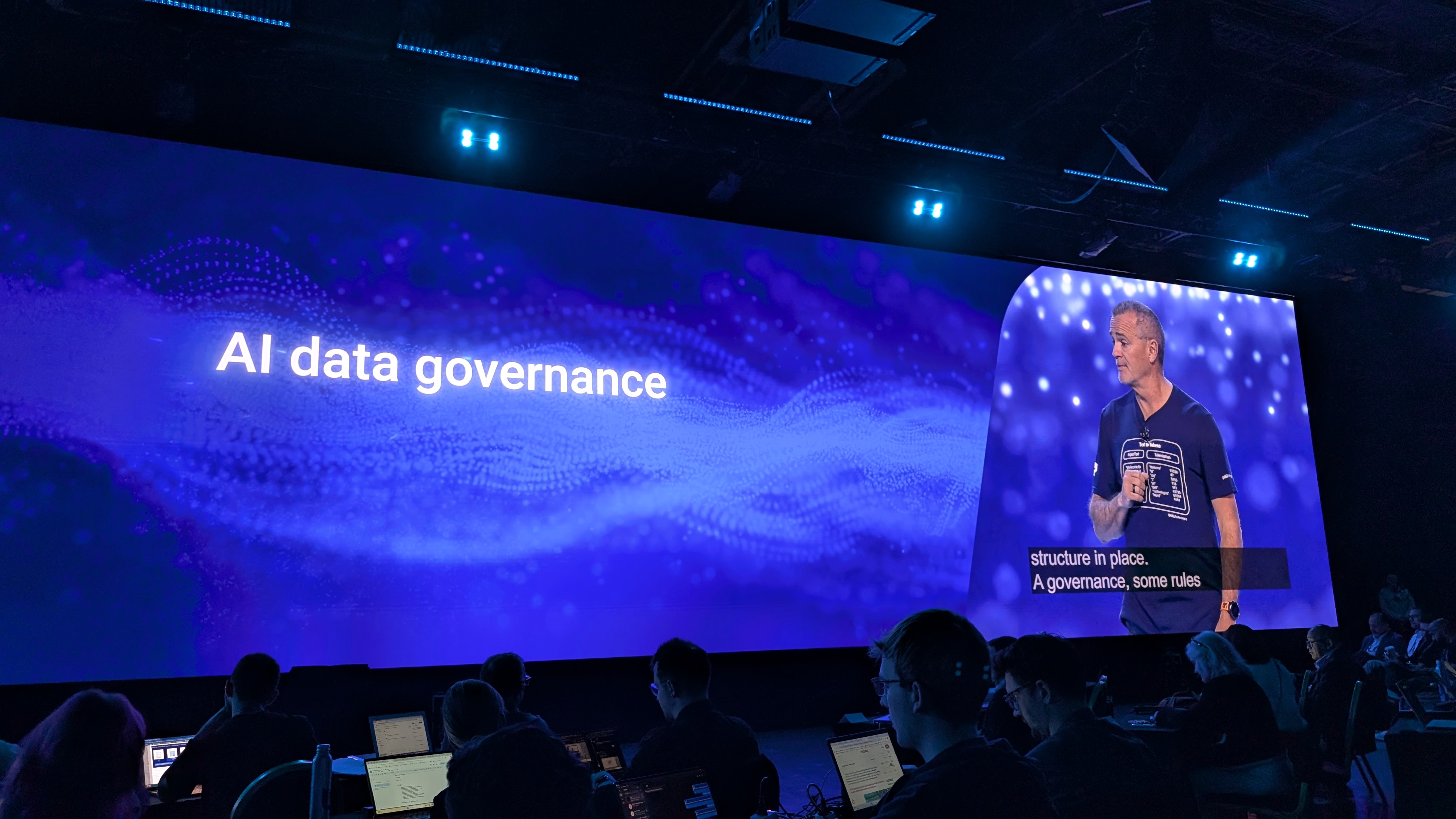
Clarke walks us through how this improved AI discipline helped Dell's professional services division get to grips with its more than 250 million assets in the field.
Gen AI was able to get previously unknown or unrecognized AI information from these huge data sets, combined with Dell's own model, giving its workers new ways of solving some of the trickiest problems facing its customers.
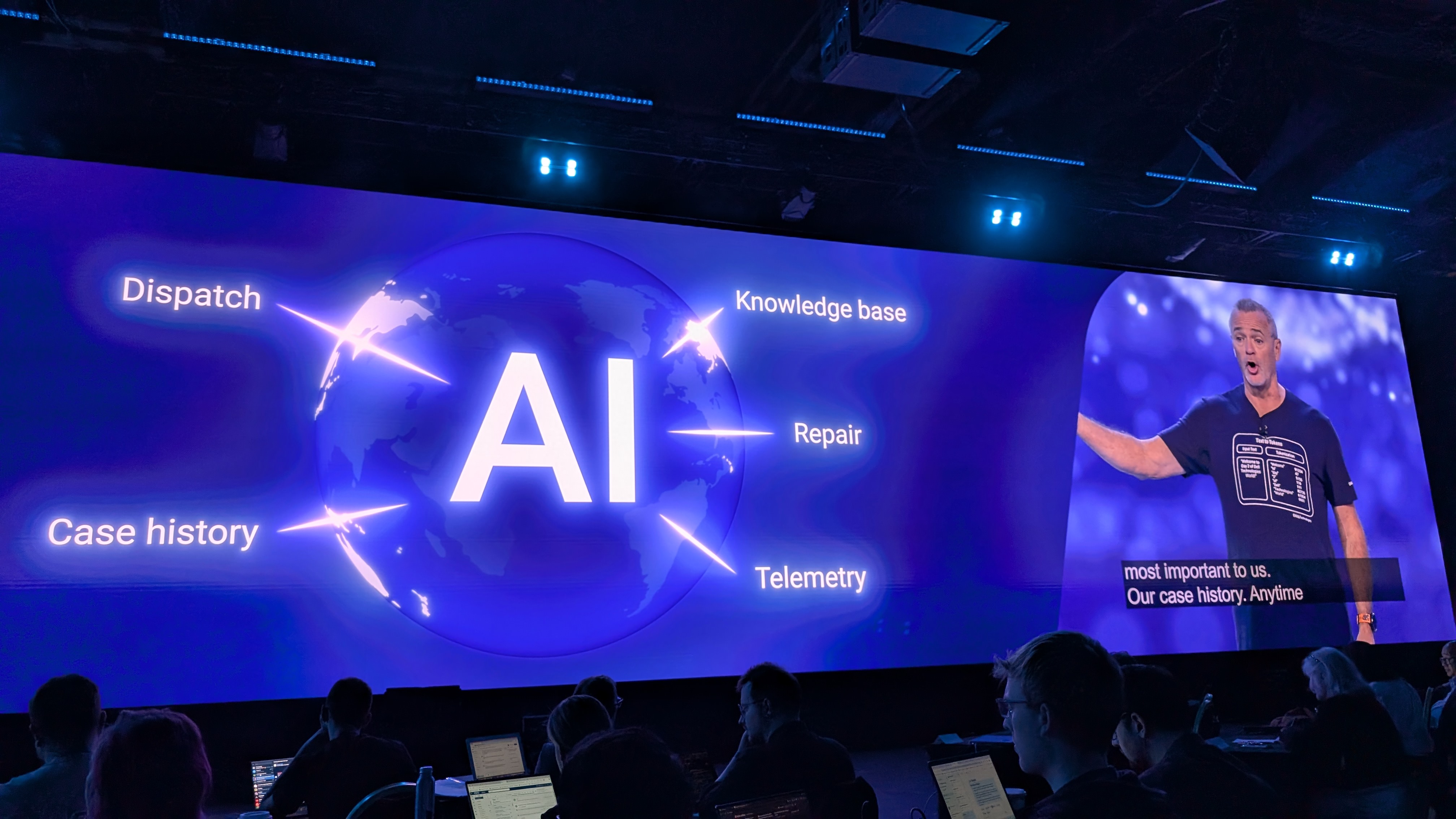
"It's really time to get busy," Clarke notes, saying Gen AI is the most disruptive technology he has ever seen, noting the threat is "existential" if your company hasn't started working on AI yet.
"Speed matters....your competition is moving fast," he warns. "If you're not moving, you're behind."
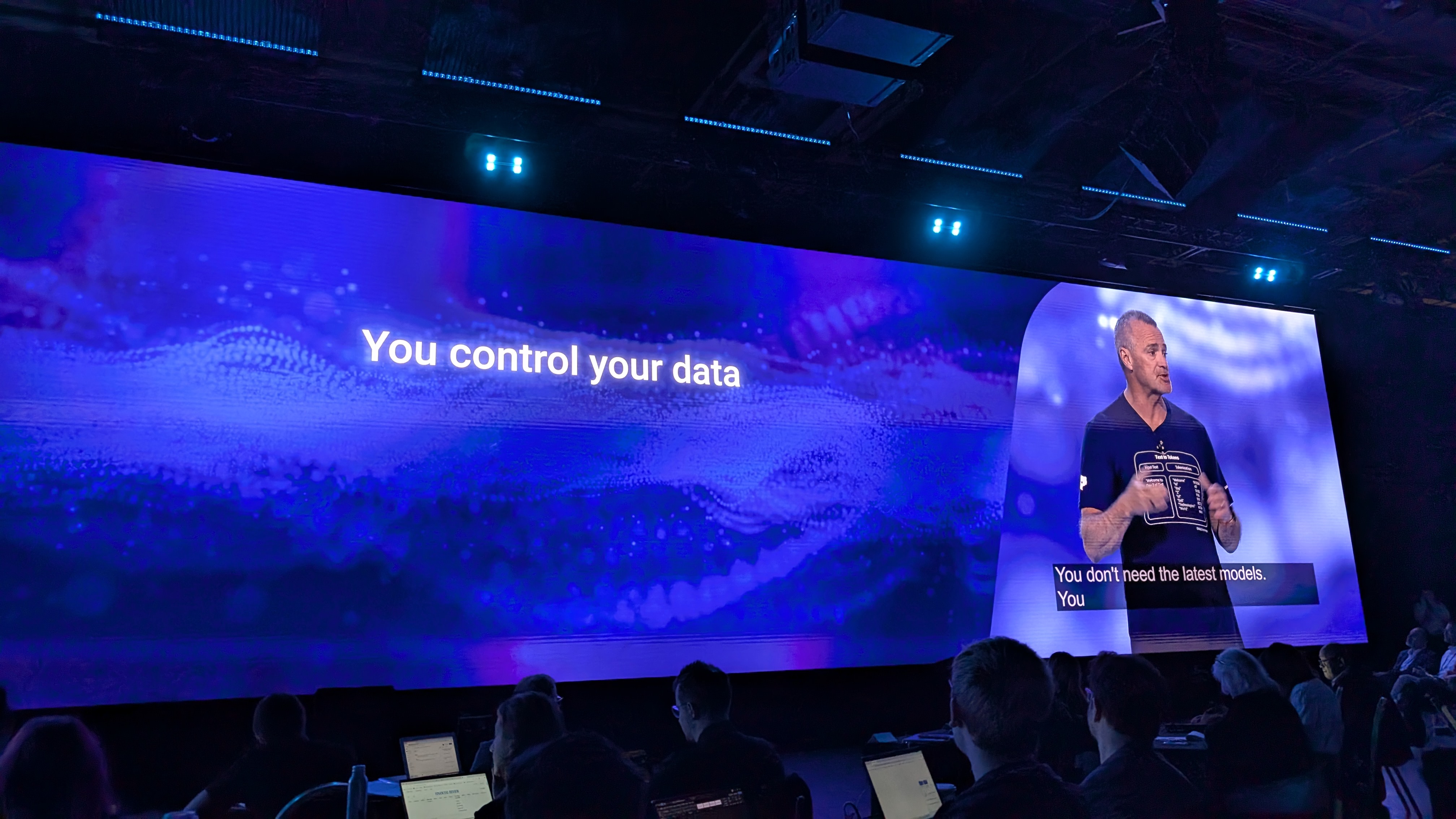
We're now pivoting to talk about "big AI" - again, primarily for the Dell AI Factory.
These advances are coming into many of Dell's range of offerings, addressing a wide range of use cases - and to tell us more, we welcome Brian Venturo, Co-founder & Chief Strategy Officer, CoreWeave.
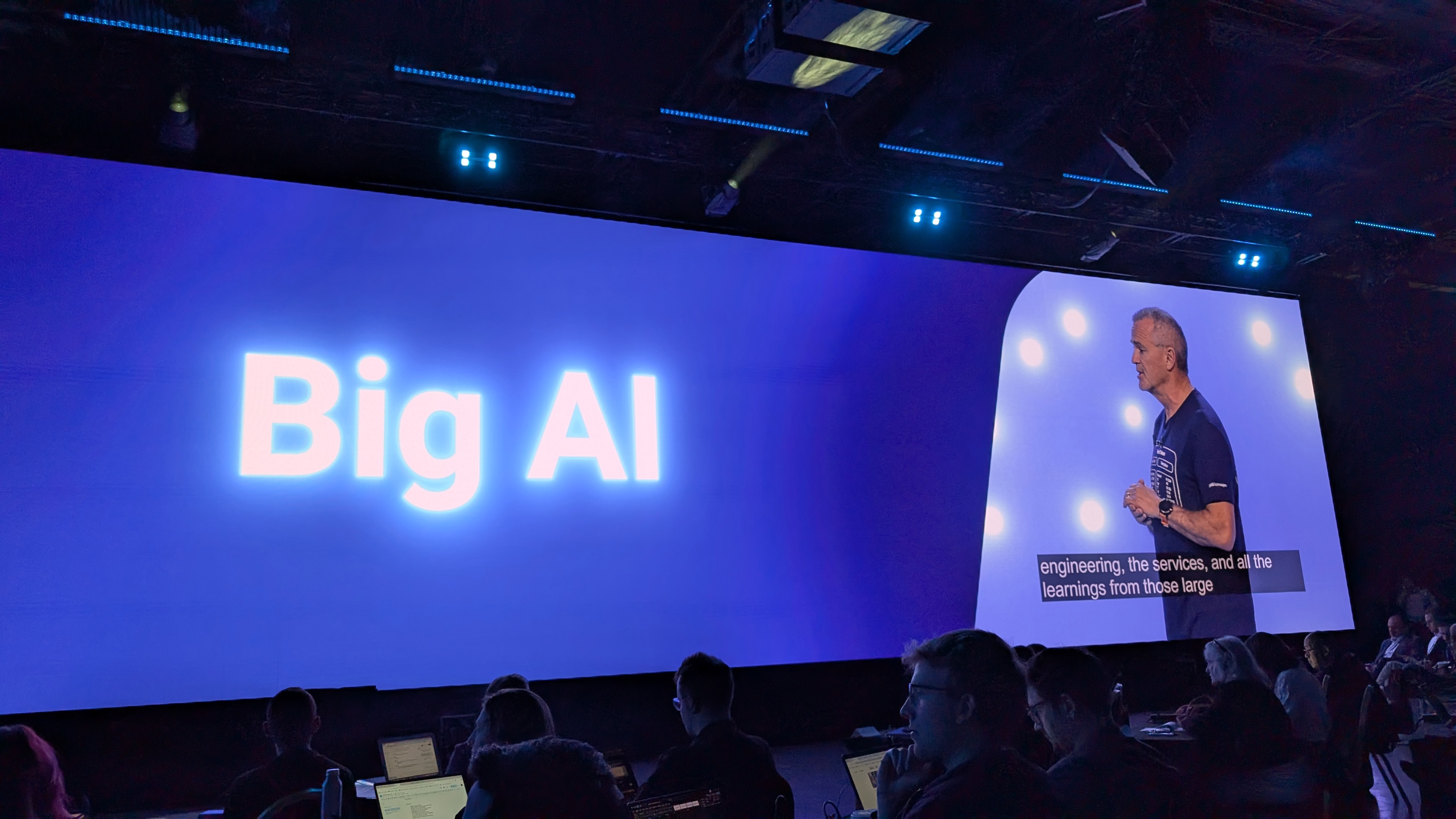
Venturo outlines how the company grew and pivoted to deal with the change in demand when it comes to compute.
But looking forward, he says he doesn't expect a single "killer app" when it comes to AI, but investing in critical infrastructure is vital.
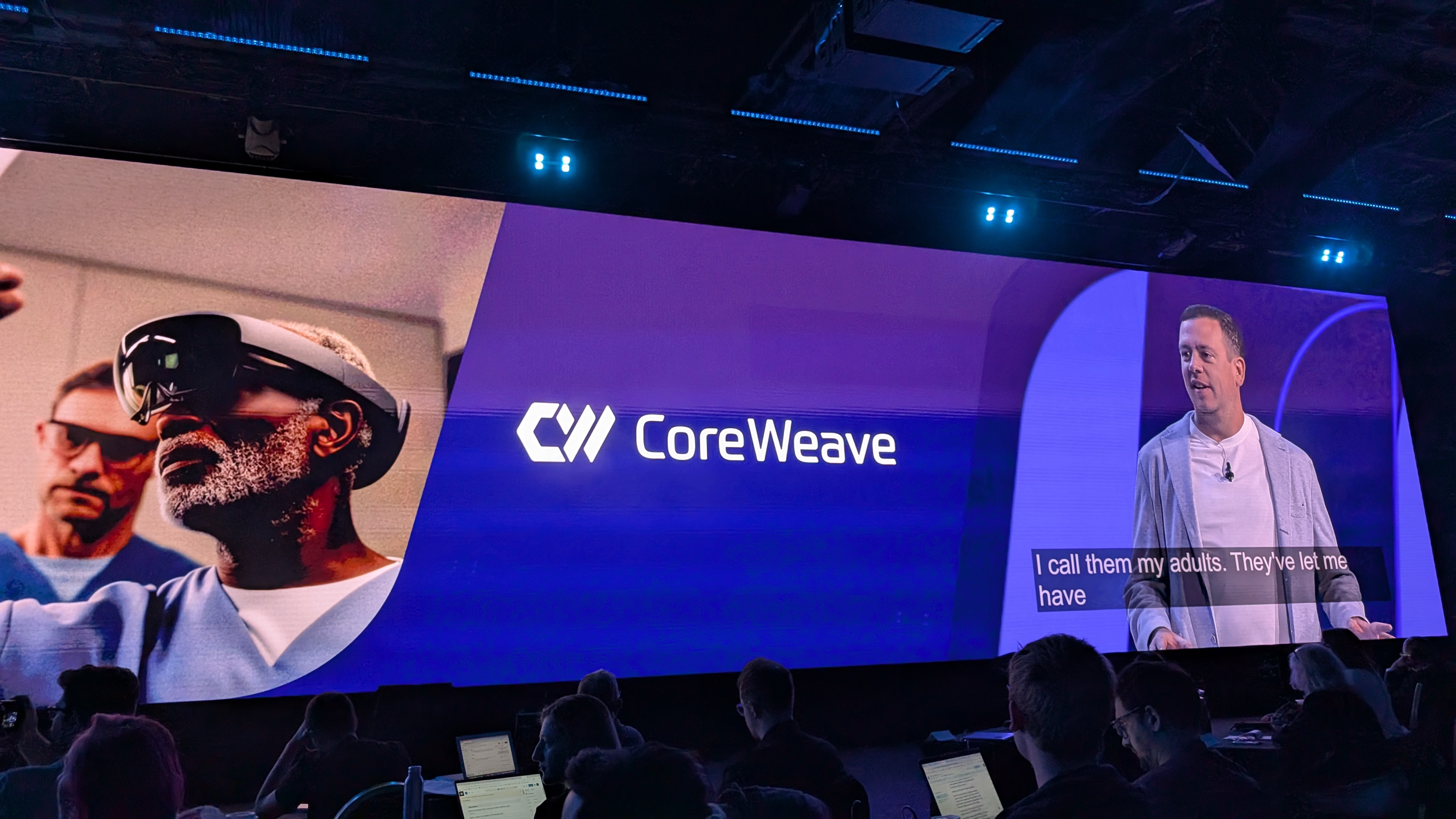
Next up, Clarke moves to look at AI agents.
Agents will soon become autonomous, he notes, allowing for much quicker completion of tasks and problems.
But humans will keep a vital role, he notes - there needs to be some management and oversight.
"AI makes an individual contributor as good as a group or team," he adds.
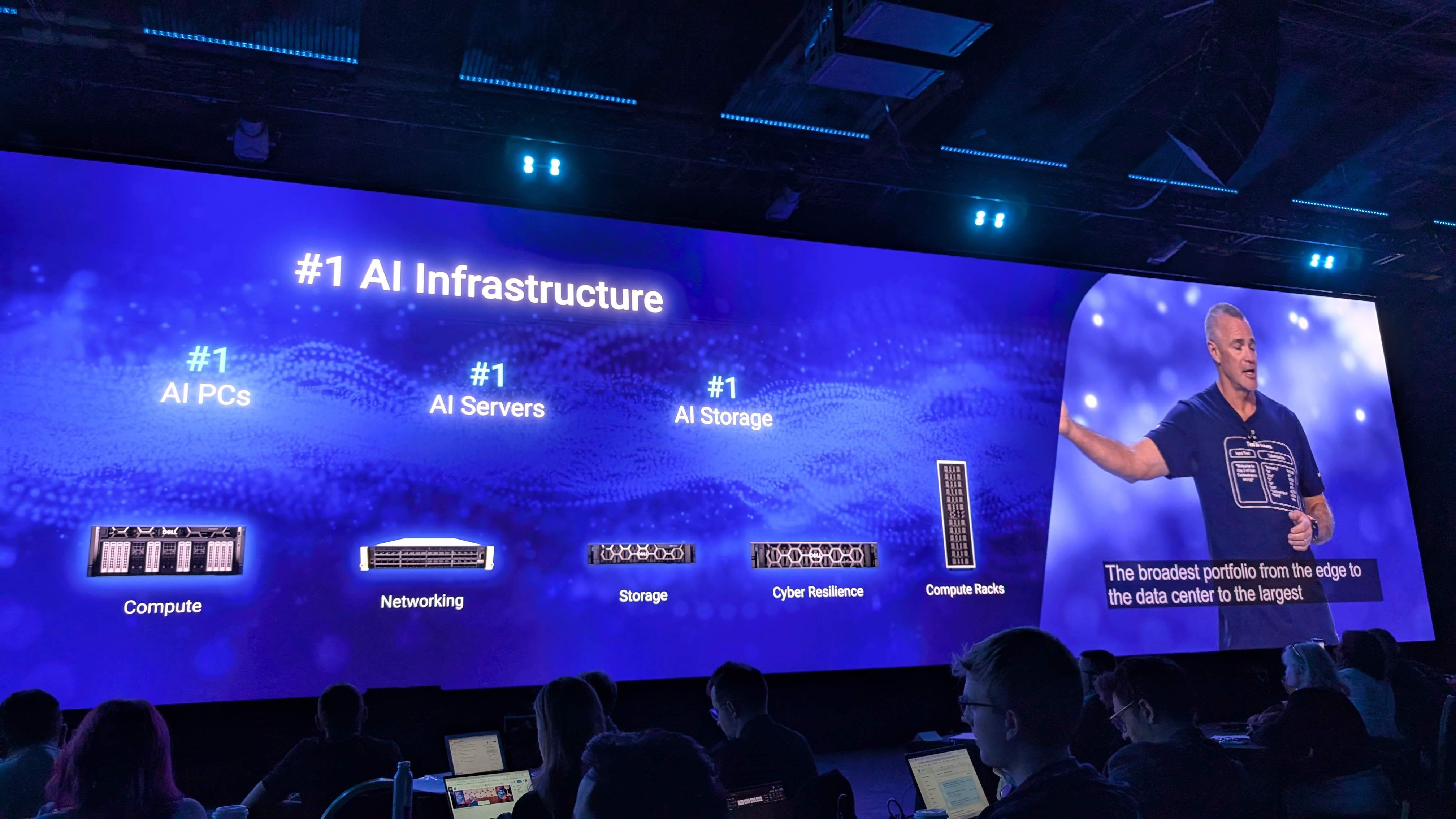
Clarke predicts agents will soon get rid of the walls between products, services and IT.
"That's the world - and the world is coming at us really fast," he notes.
AI factories will become token factories, he predicts.
On that, Clarke is off, and we welcome Arthur Lewis, President, Infrastructure Solutions Group, Dell Technologies, to the stage.
"At Dell, we are not just seeing the next wave of innovation - we are building it," Lewis notes, saying the company is helping customers deploy AI "where it makes sense."
"Now is the moment...the moment to shape what's next," he declares.
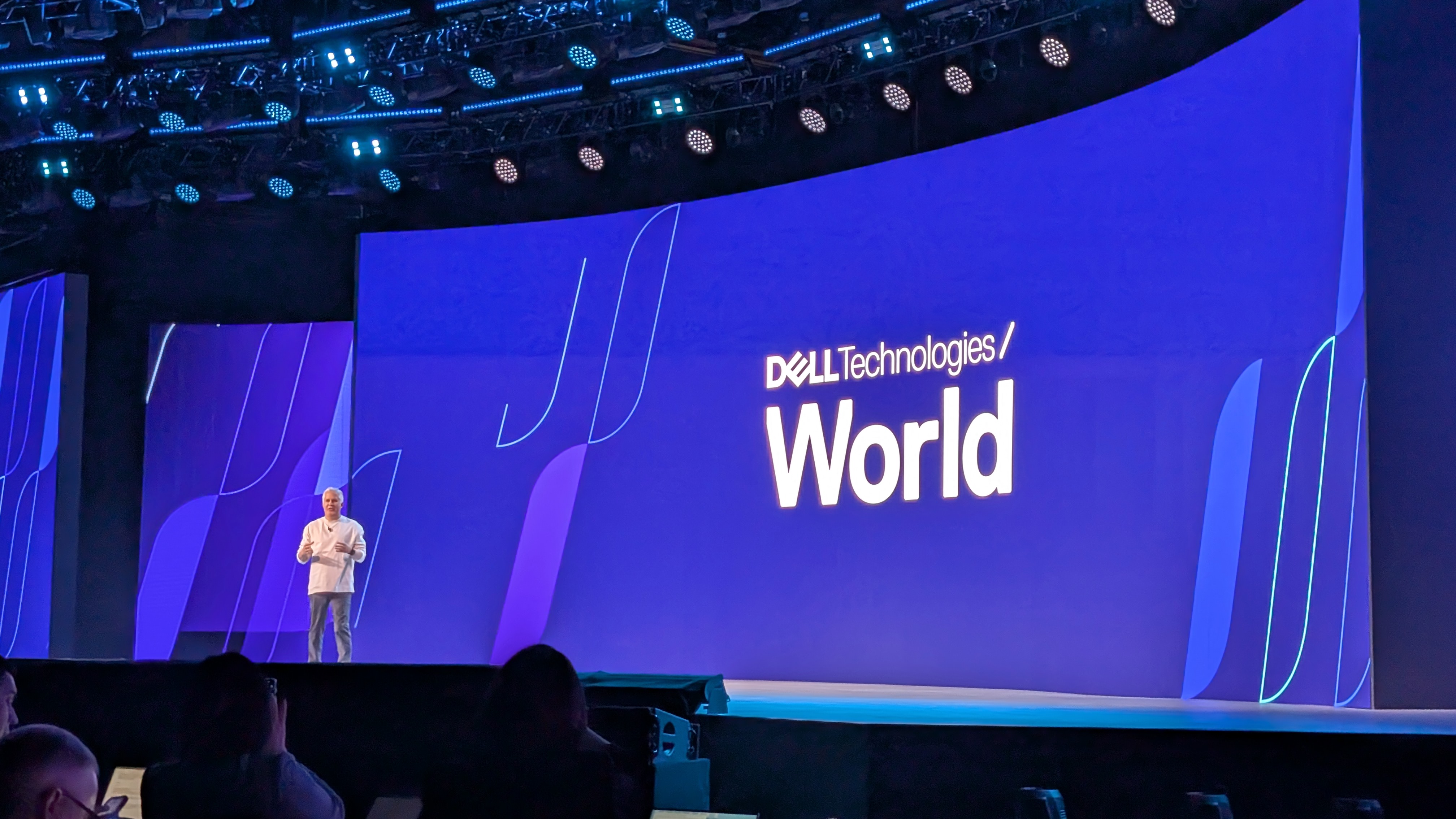
Lewis wants to talk first about data strategy - a crucial consideration when it comes to gettign the most out of AI.
The new Dell AI Data Platform is set to play a major part in this, he notes - from storage to analysis.
On the former, he shows off upgraded PowerScale offerings, ObjectScale products, and Project Lightning, the "fastest parallel file system in the world".
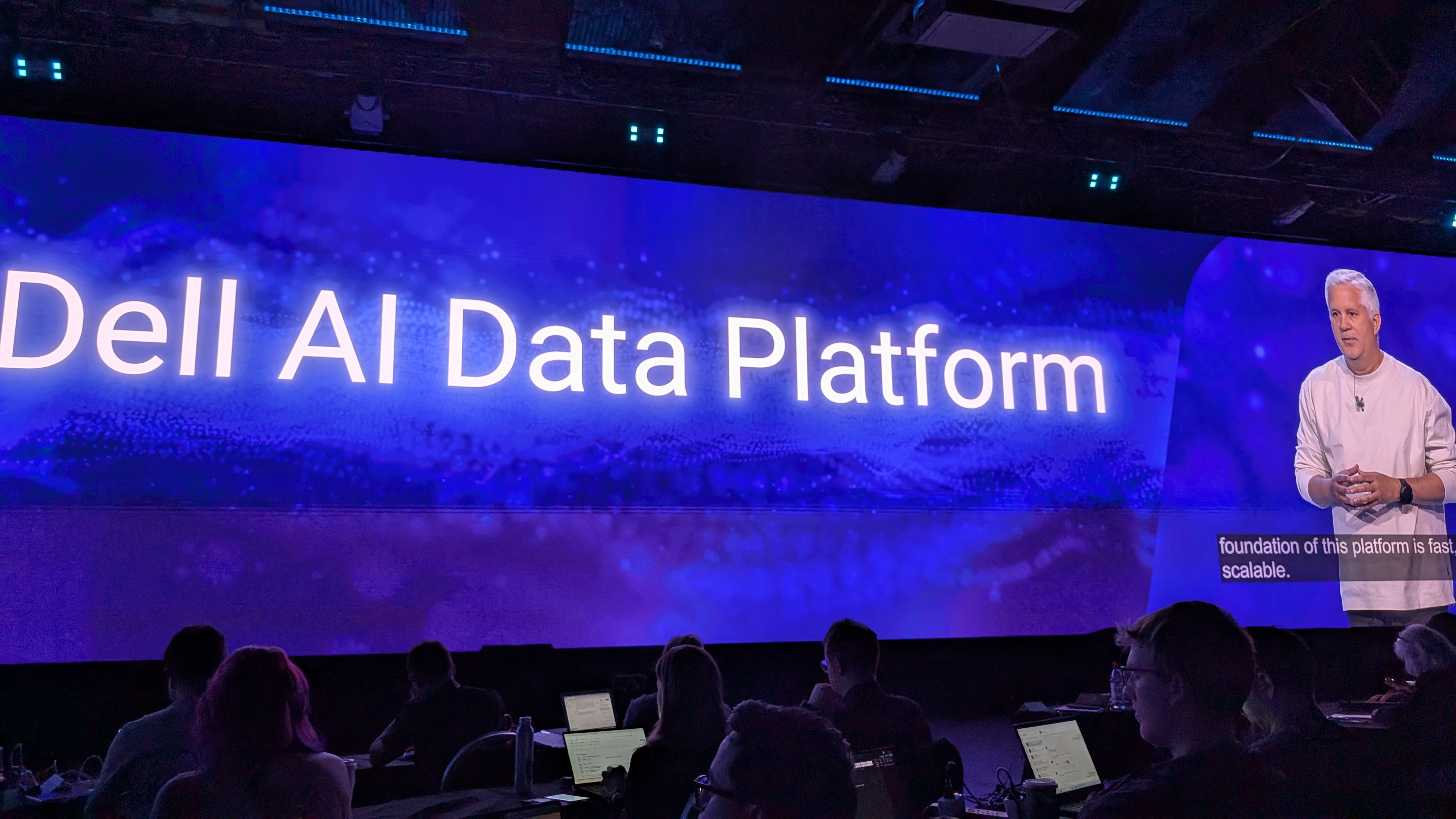
Lewis also outlines the new Dell Data Lakehouse, offering seamless access to your organization's data, providing unfified data management.
Lewis then turns to partners - and Dell has a whole range of enterprise AI partners to celebrate what he calls, "making AI real".
This includes a new partnership with Google to bring Gemini models on prem - only for Dell customers, who can deploy Gemini on Dell PowerEdge servers.
There's also a new partnership with Cohere, and Lewis invites Aidan Gomez, CEO and Co-founder, Cohere, on stage.
Gomez walks us through a demo of Cohere's work, which focuses on making AI secure, giving enterprises strict control of their data throughout.
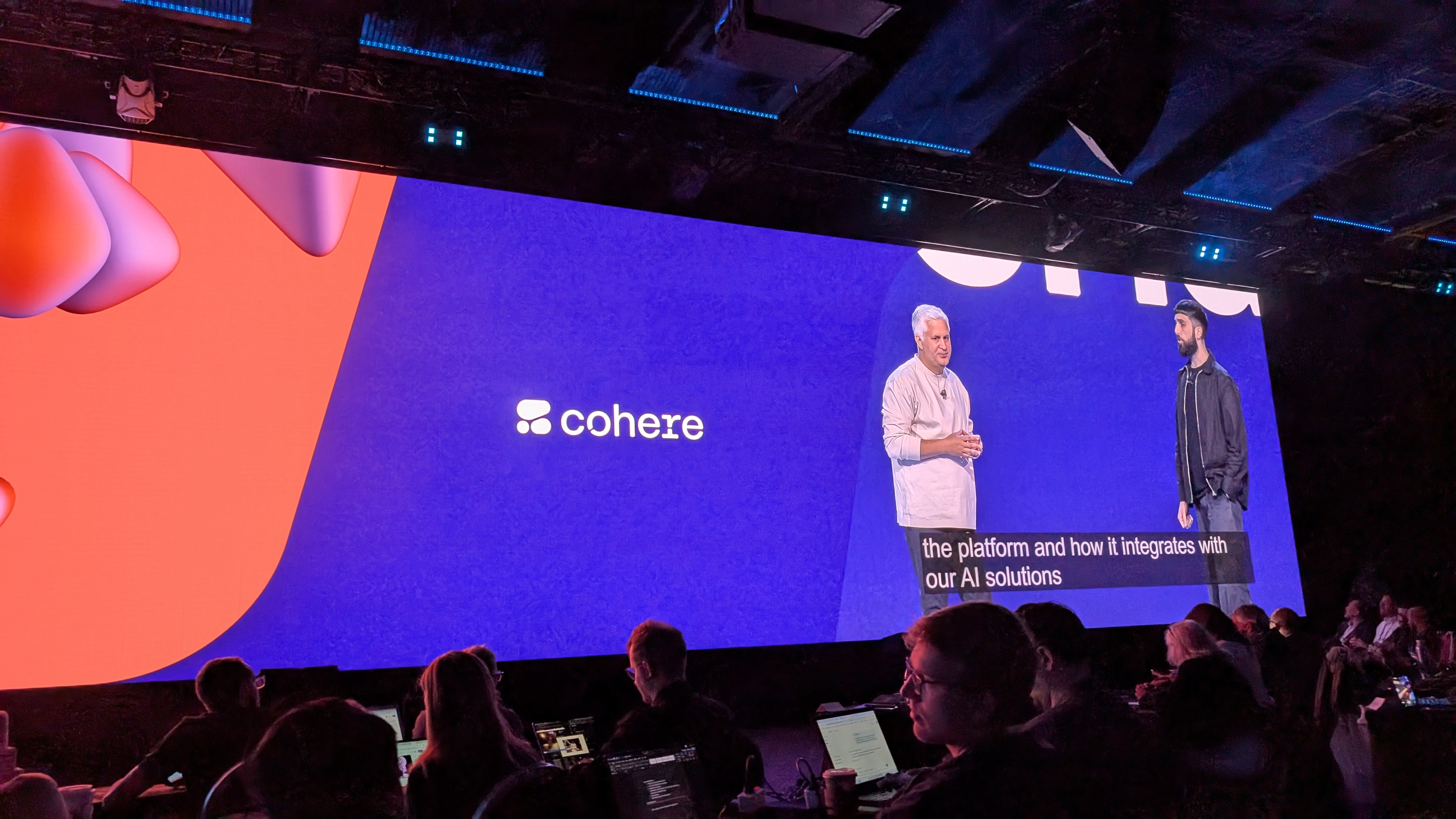
Lewis now turns to private cloud infrastructure to support AI data centers going forward.
With a move towards disaggregated infrastructure for greater flexibility and avoiding vendor lock-in, this need has never been more important, he notes.
Dell's PowerStore suite now has over 17,000 customers worldwide, he says.
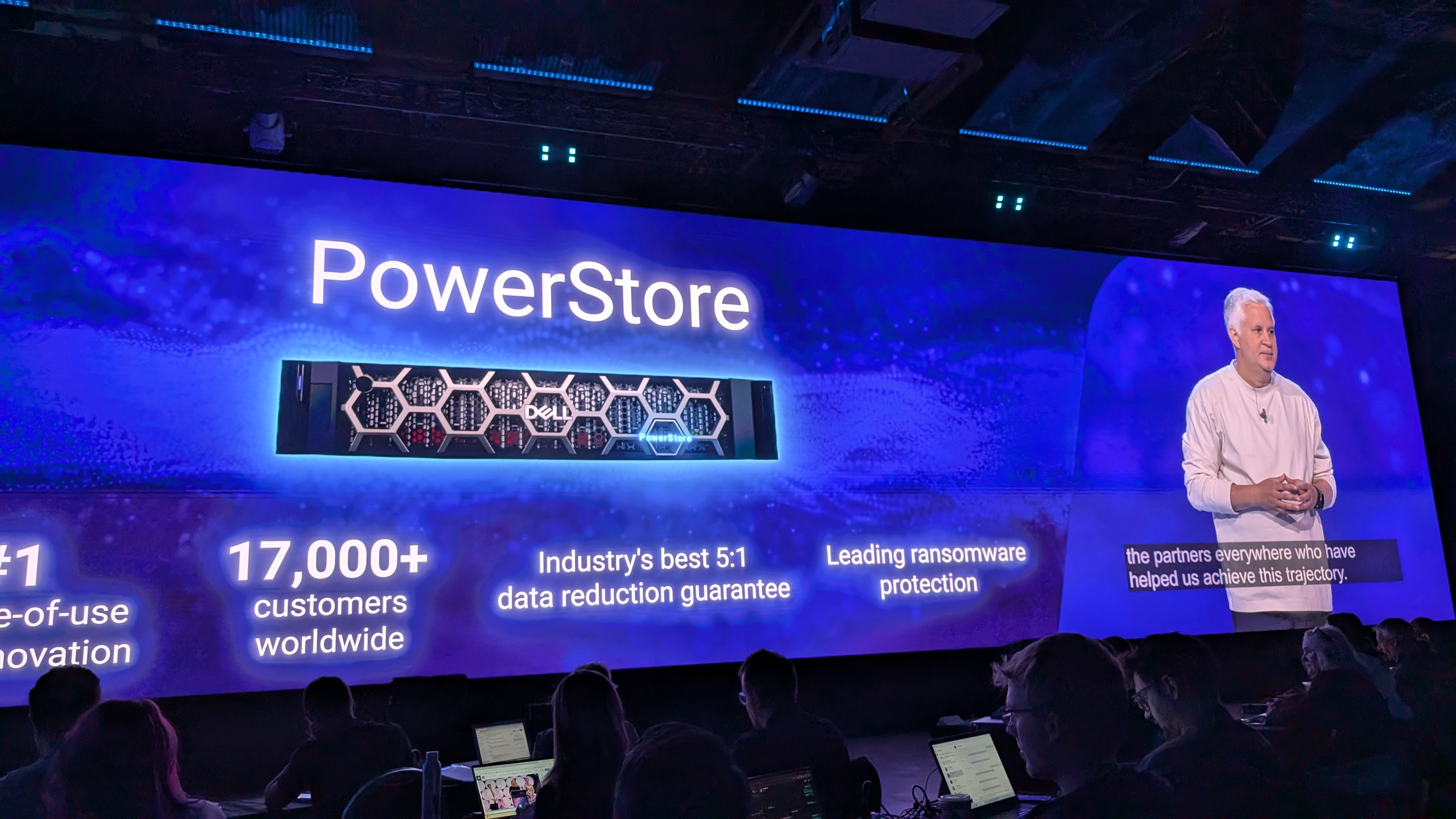
Lewis moves on to software - the other side of the success story.
This includes new Dell Private Cloud software, aimed and making deployment of private cloud "suepr easy", he says, with Dell's Automation Platform at its core, giving customers control, agaility and scale when it comes to scaling compute and storage.
"As you can see, we've been incredibly busy building the future," he notes.
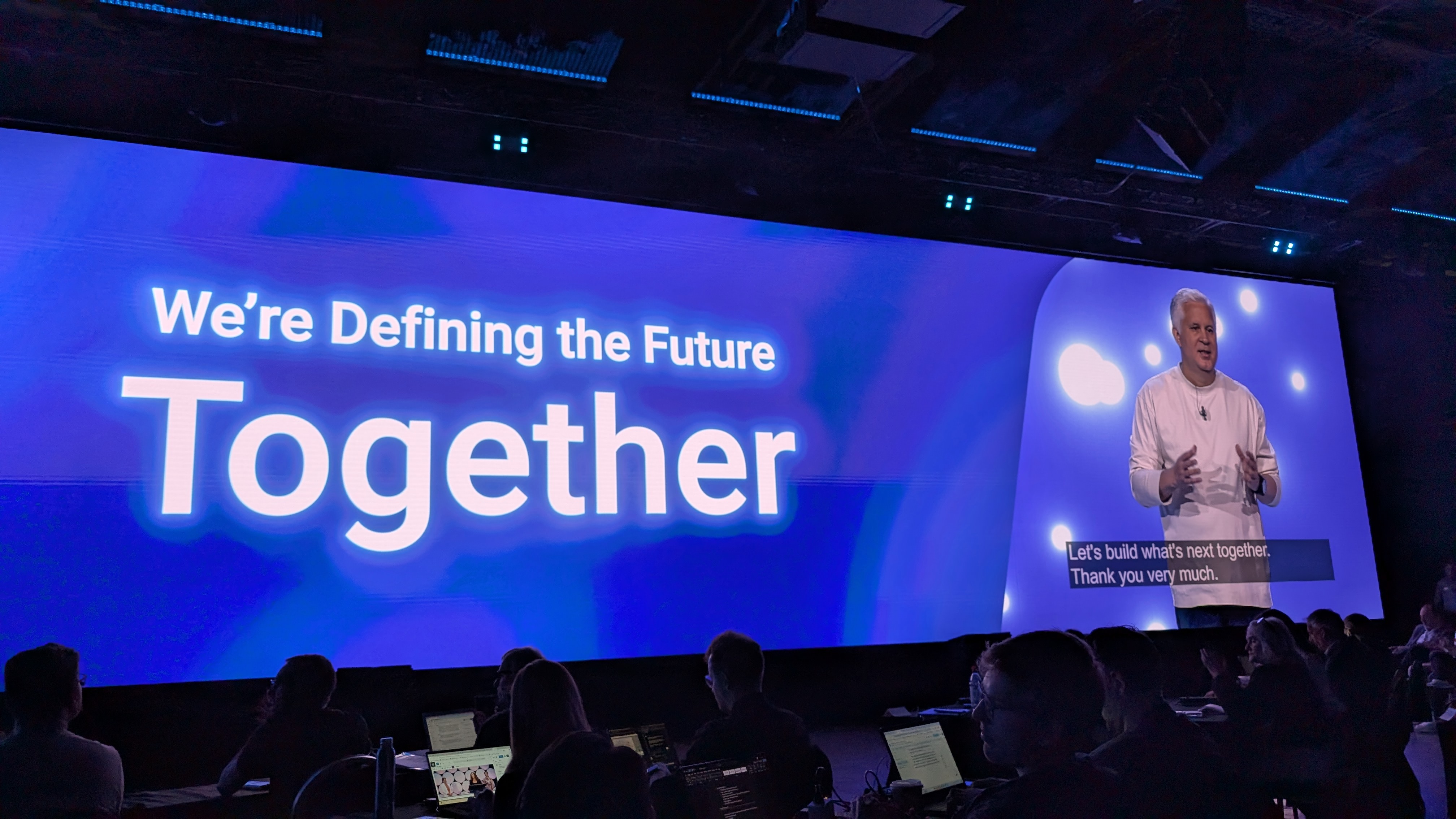
And with that, Lewis bids farewell, and welcomes Sam Burd, President, Client Solutions Group, Dell Technologies, on stage.
The PC can be "the ultimate edge device", Burd notes, giving improved flexibility and scaling possibilities.
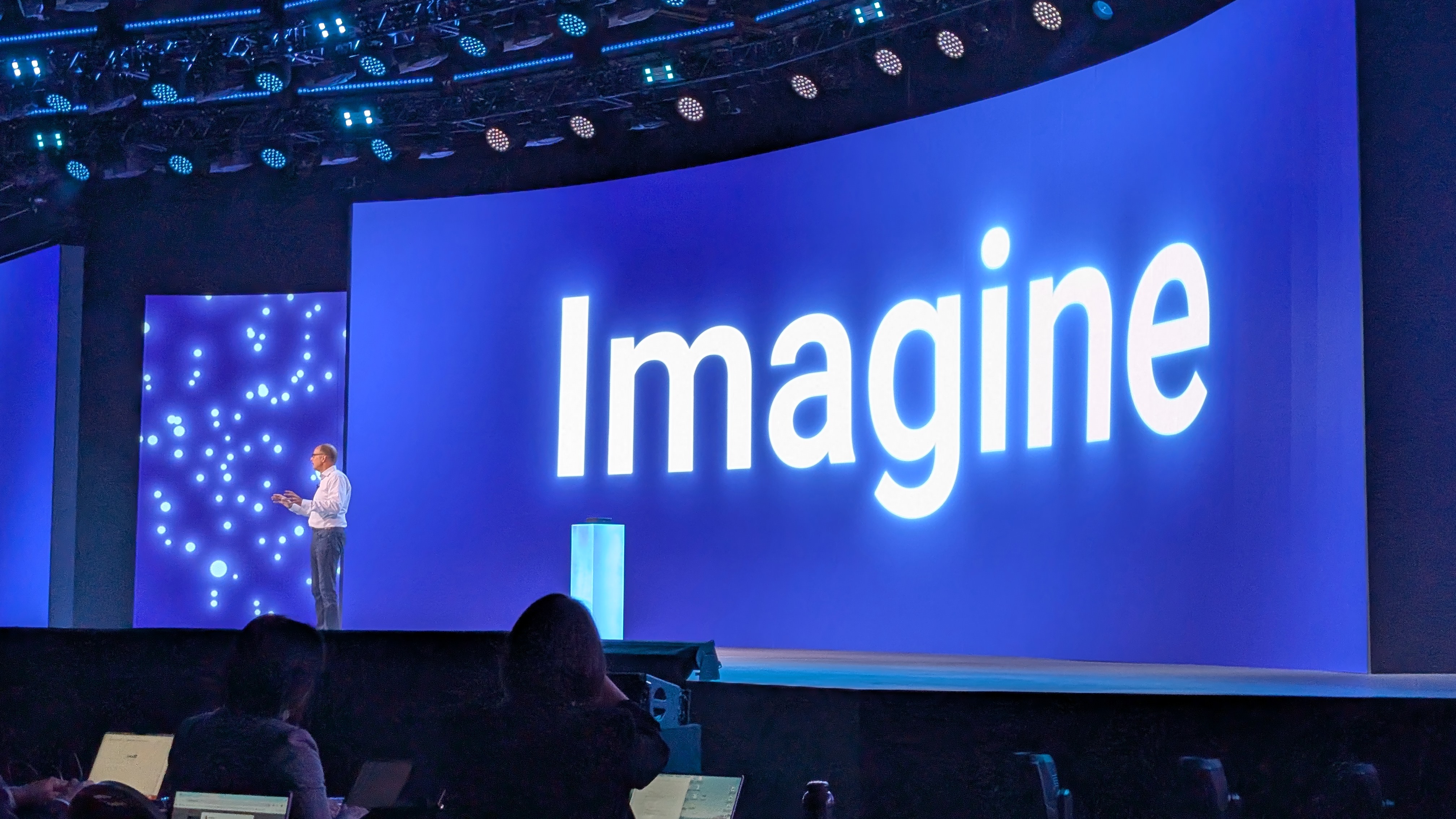
Burd shows off the Dell Pro Max GB10, a powerful but tiny workstation developed in association with Nvidia, able to provide up to 1 petaflops per second.
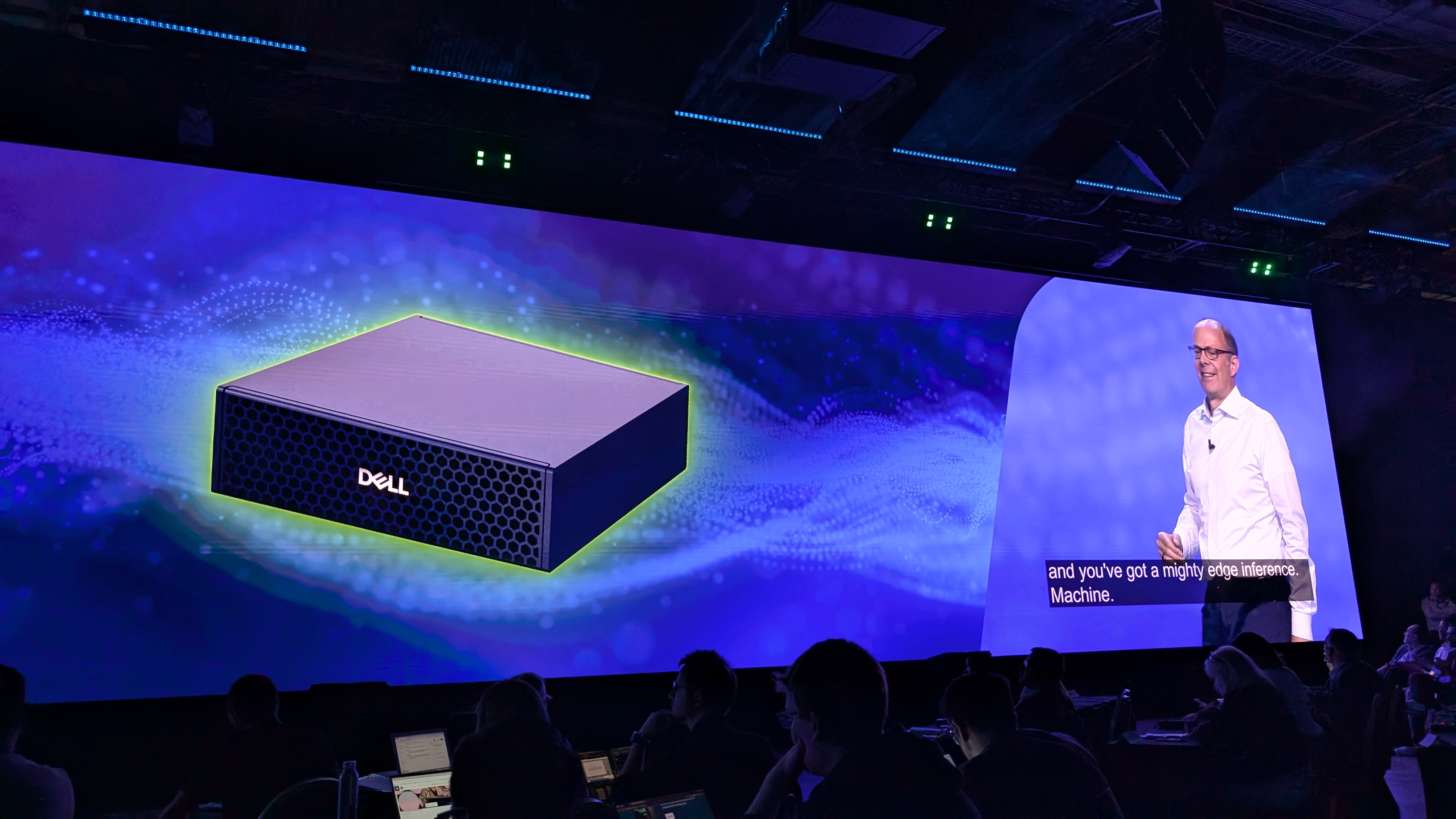
Burd welcomes Rob Johnson, Executive Director, Workforce Digital Services, USAA, on stage, to demonstrate how companies can benefit hugely from investing in AI PCs now.
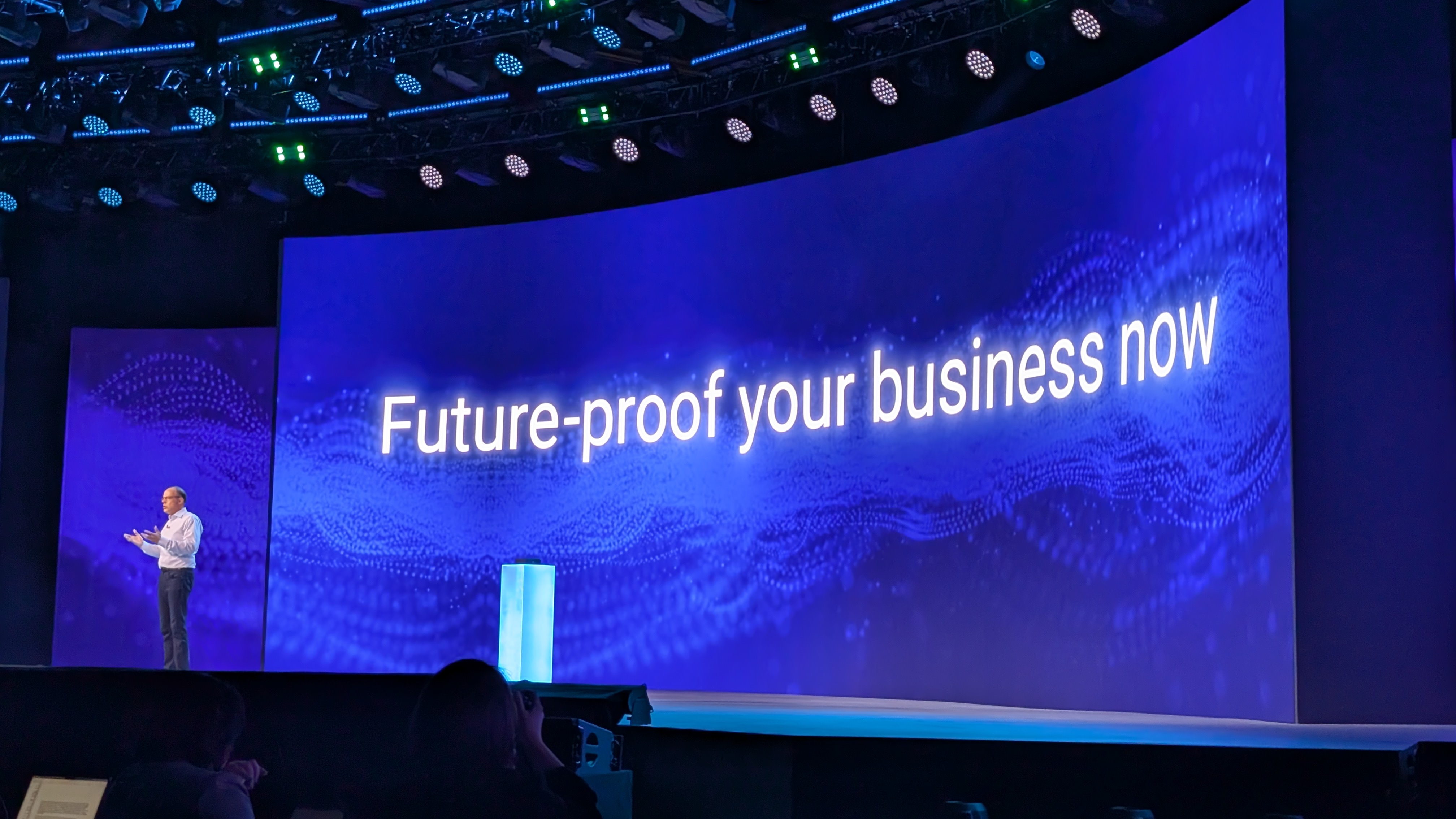
Better battery life and better performance are some of the most obvious advantages offered by AI PCs, Johnson notes - especially with more of us on video calls all day.
Burd looks to bring us home now, focusing on how useful on-device AI can be.
He uses the example of a healthcare provider to develop and train an LLM model to interpret X-rays and draft reports for radiologists, boosting productivity hugely with no loss in accuracy.
Having these kinds of models on a mobile workstation, which can be driven out to remote communities for easier diagnosis, could be a huge game-changer, he notes.
"It's inspirational - and it's transformational," he notes, highlighting the new Dell Pro Max workstation will be able to do just this from later this year.
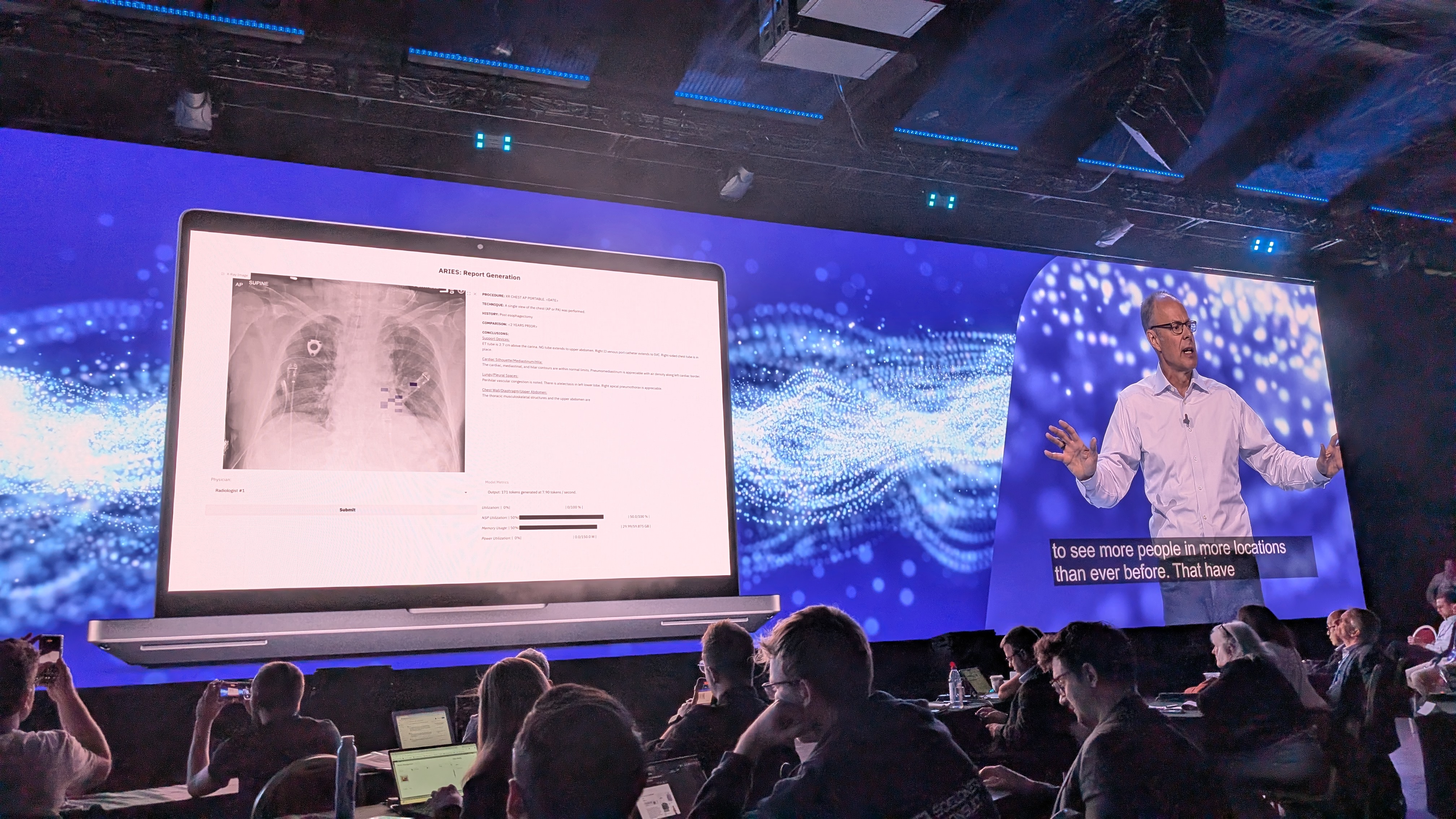
The new Dell Pro AI Studio service can make deploying LLMs to fleets of laptops easier than ever, Burd reveals, running the same model on all your devices in a much quicker deployment.
Burd also notes Dell is pushing its security work, alongside making device management easier through a single BIOS image - which now extends to displays and peripherals management, saving IT admins lots of time.
Reliability is also another key differentiator, Burd says - being tougher and more impact resistant than the competition.
Burd thanks customers for their trust, and shows off some impressive stats about satisfaction and acceptance.
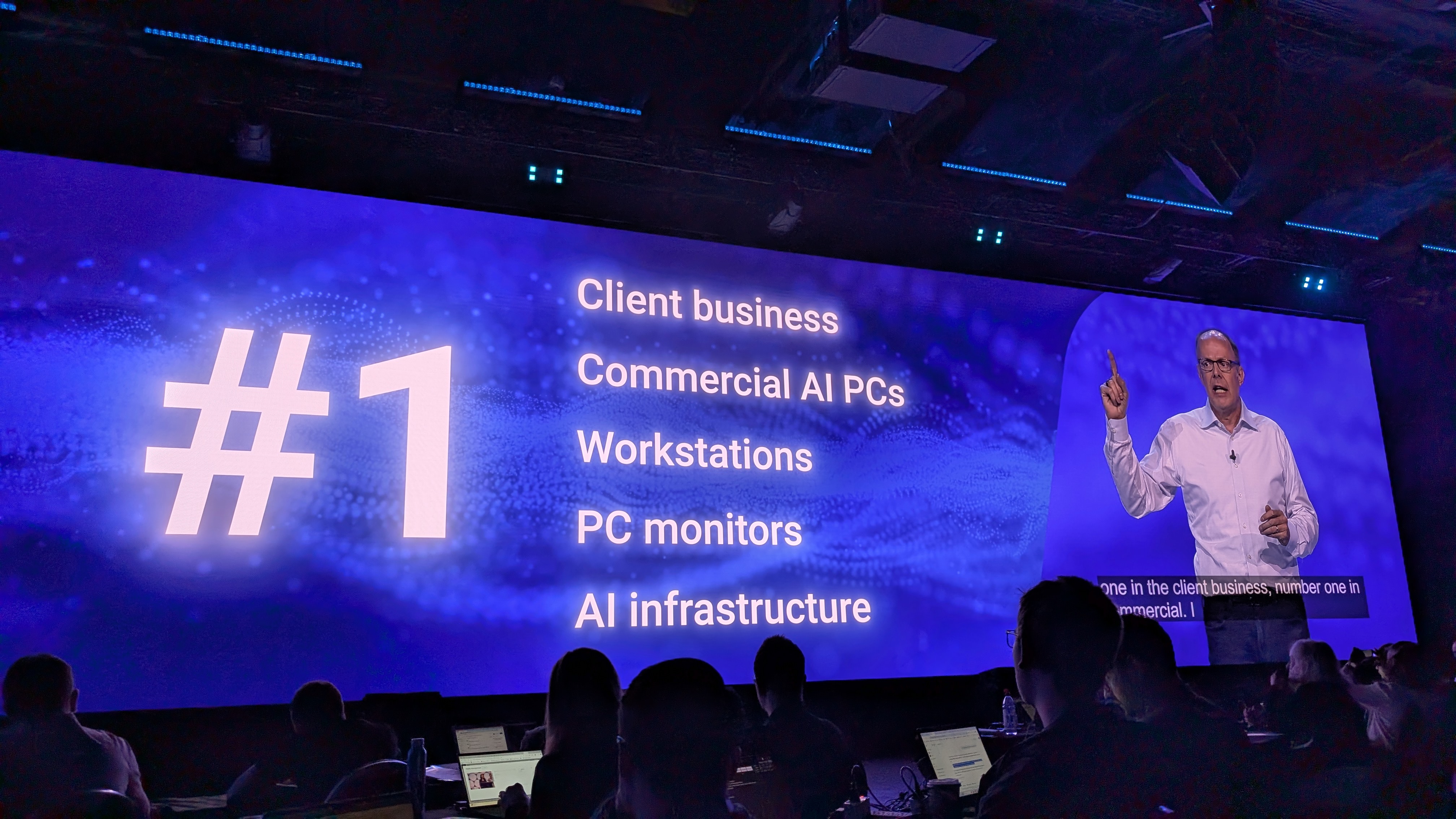
Clarke is back to wrap things up - with another warning about getting on the AI train before your competitors do!
That's the end of the keynote - but we're sticking around for a press Q&A with Michael Dell and Jeff Clarke, starting very soon.
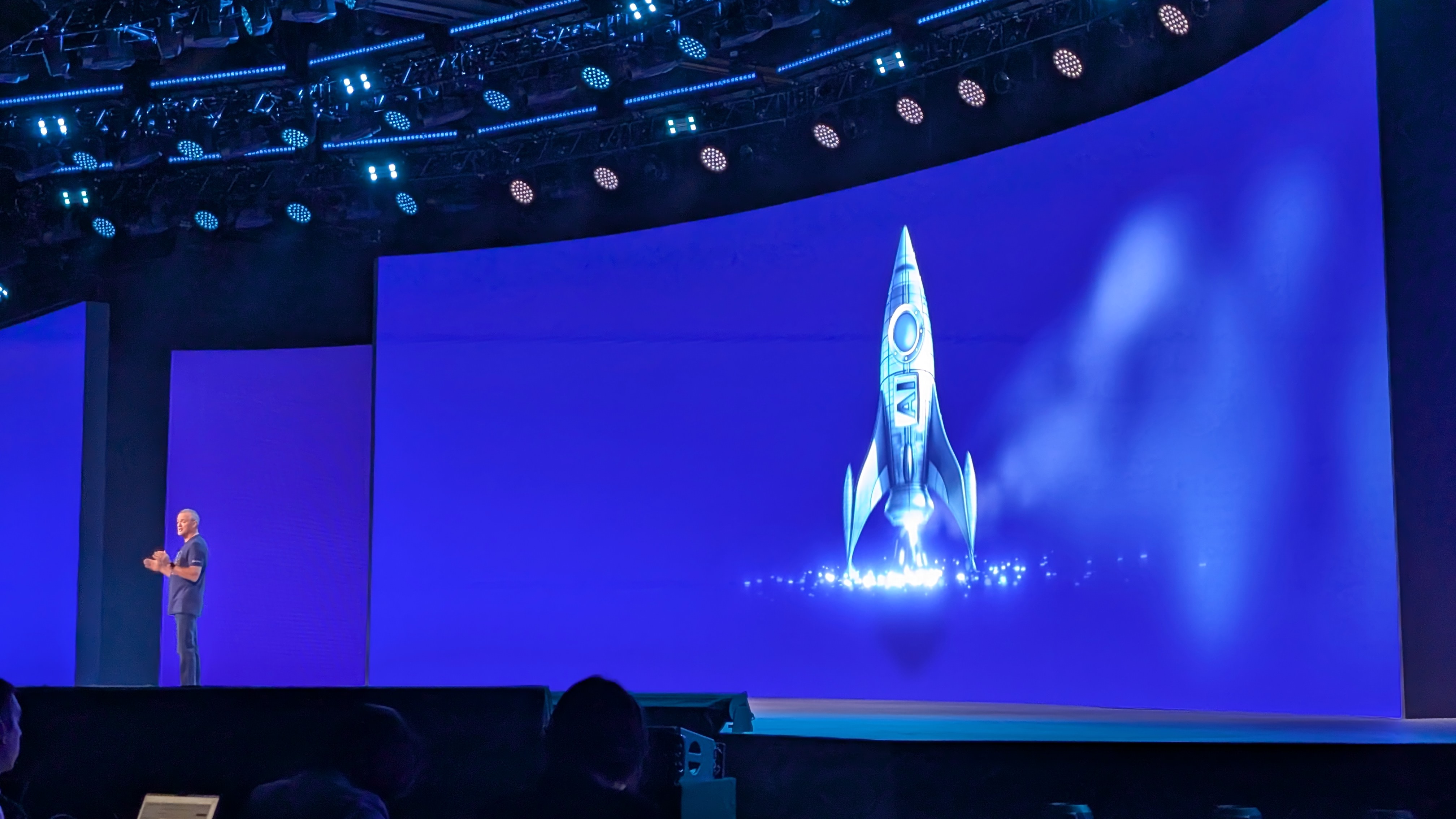
OK - after a quick hiatus, it's time for the Q&A with Michael Dell and Jeff Clarke, along with Sam Burd and Arthur Lewis.
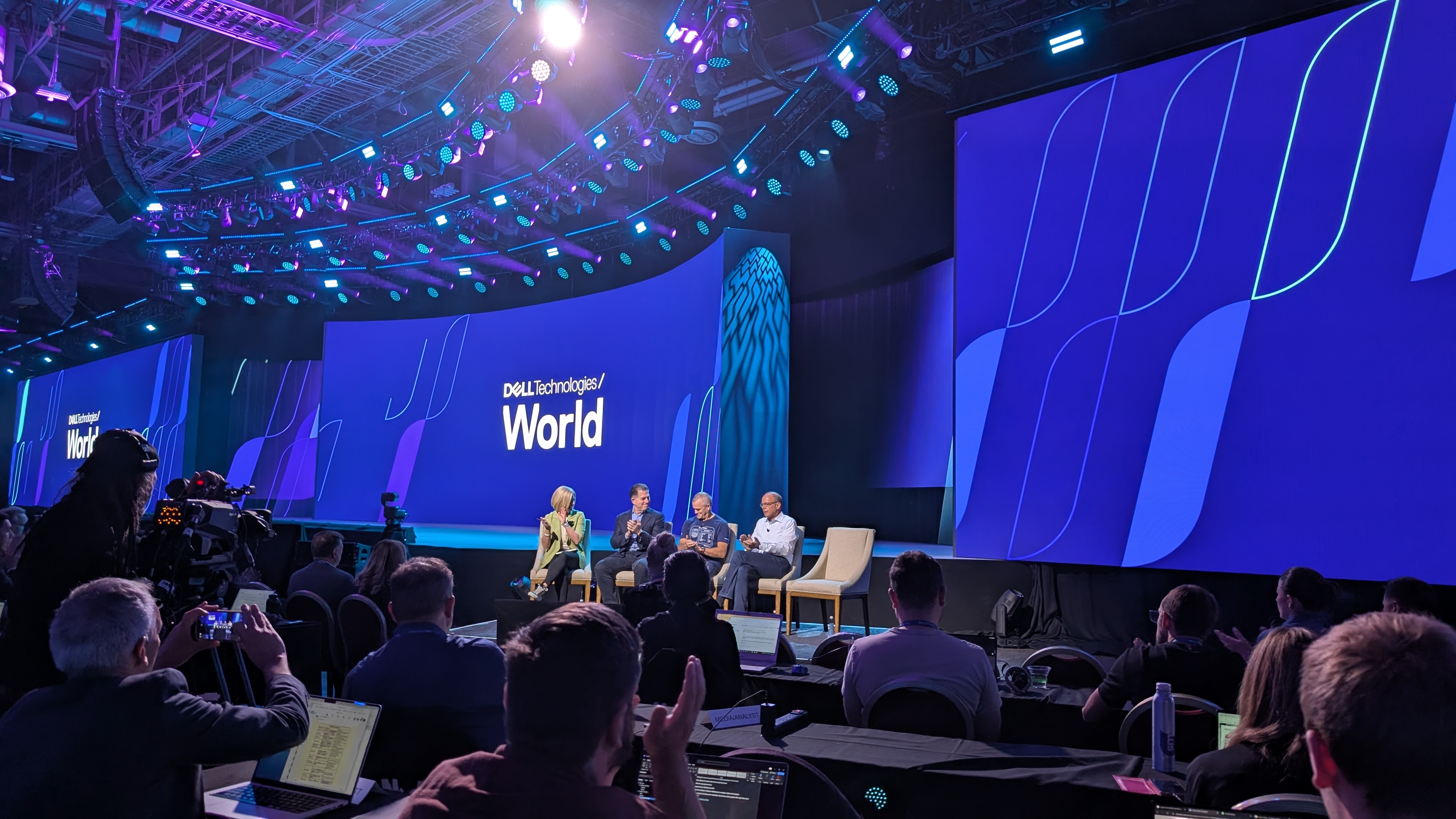
The first question is about customer success - Dell notes that although some customers are well set on their AI journey - some also do need help.
Clarke adds Dell's job is to simplify AI for its customers - whether this is breaking down larger platforms, helping with deployment, or offering support on professional services.
Lewis adds it's all about democratizing technology.
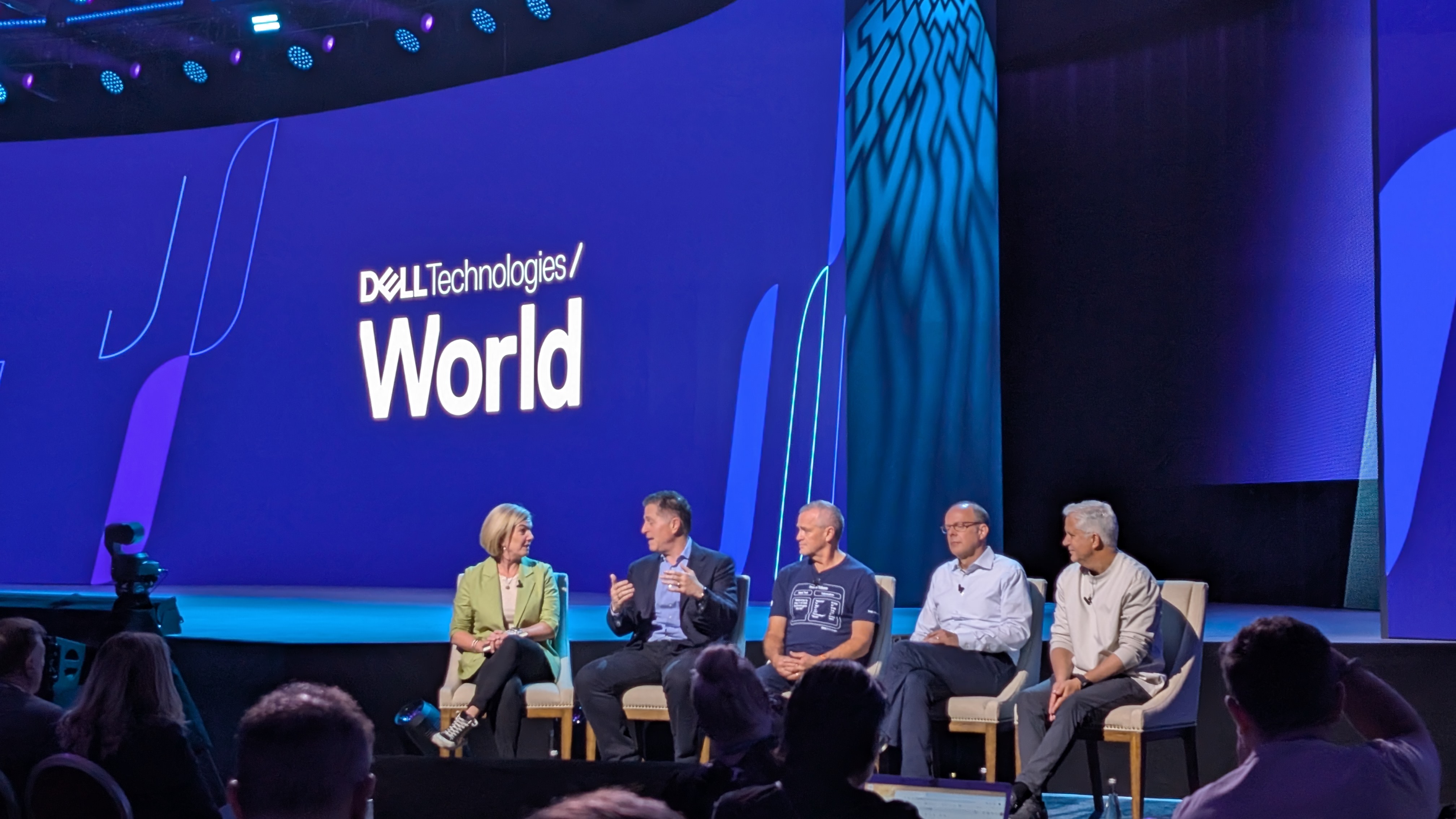
Next up, TechRadar Pro asks about how we keep the human worker involved as AI takes over more and more tasks.
Dell replies that as with every major technological advance, there may be losses, but also great opportunities.
He notes that many roles in IT today simply didn't exist 10 years ago, and companies will need to reimagine themselves, and think about what its activity should look like in a few years.
A question about Dell's relationship with data - which industries are showing the most promise and success, especially when it comes to unstructured data?
Lewis notes healthcare, retail and manufacturing as particular success stories, and that Dell's role is being a knowledgeable and trustful advisor, from early on, throughout the whole process.
Clarke adds the growth of object data is set to skyrocket, so having the right disaggregated storage architecture is vital.
Next, a question about acceleration vs transformation in AI - and the role agents will play in this.
Clarke notes the progress shown by agentic technology in IT management alone shows the huge potential of what it could do for the wider world.
"It's pretty exciting - if you think about the progress we've made already, that's only the start," he adds.
Lewis notes the pace of innovation is "just incredible" - so there's no way to anticipate what will happen next.
A question about the Dell AI Factory next - are there concerns about the effects of wider political and economical events in looking at the future?
Dell agrees these are issues and challenges - but the general company view is that the opportunities presented by this technology is bigger than any potential roadblocks.
"Tokens are bigger than tariffs," he chuckles. "But there's a limit to what we can do about it - we want to focus on what we can control."
A question about Dell's supply chains next - will the company move away from China and the US, towards emerging markets such as India and Vietnam?
Clarke emphasizes Dell operates a global supply chain - which Dell notes is "undefeated" - which has navigated multiple challenges over the years, and has been digitized to anticipate and deal with any changes or problems.
"We're confident we can navigate whatever the world throws at us," he adds.
Next, a question about Windows 10 End of Life - is Dell doing anything differently to help customers navigate it?
Burd says there are probably around 500 million PCs that need upgrading - and Dell is working with its customers to get them onto Windows 11 PCs.
Unsurprisingly, Dell's new AI PCs could be a great fit, he notes - "We see the opportunity out there, and we have great devices."
Clarke adds there are concerns about the development of such devices over the next few years - but investing in the right hardware will set your business right.
Dell adds the company had an aggressive campaign to recycle older products, and is trying to ensure new devices feature reusable hardware and have more sustainable options.
But he does say many customers have the right idea - and are very proactive about recycling older devices.
Next is a question about where customers should deploy their AI and share their data.
Dell notes the company has been building airgapped storage methods for some time, and the new Google Gemini announcement shows the strength of such approaches.
"There's no question in our mind most data will be created in the physical world, and the AI will be very close to where the data is being created," he notes.
A question about Dell's conversation with Jensen Huang yesterday, and if the two share any leadership principles.
After a considerate pause, Dell highlights a simple thought of how transformational technology can disrupt a business - and why you should always try to be on top of that.
Having a real understanding of what a new technology will really mean for your business is also vital, he notes.
Next, a question for Jeff Clarke - any advise on how to measure benefits and success of AI projects?
"Get busy," he replies with a laugh, but notes there have to be standards - highlighting the company turns down "around 90%" of requests to use AI internally due to the ideas not being up to scratch.
How does Dell ensure green and sustainable approaches are used to get the most out of AI?
Clarke highlights recent findings that show many enteprises do have unutilized power opportunities, and adds Dell is constantly working to build the most efficient products it can.
Lewis adds the importance of looking forward, not backwards - you need to think about the future, which is aiming for more efficiency and cost savings.
Our final question is about Dell upskilling its workforce to address the AI opportunity - and how does it retain this talent?
Dell replies the company has been going through an ongoing series of upskilling across the workforce, and the employees are keen to learn.
However he does note there are some issues when hiring employees for brand-new titles which have only just been invented - that's where the need to change and adapt is crucial.
That's a wrap on the Q&A - we're off for lunch, but will be back shortly!
As promised - here are some pics from our early look at the Dell stand on the show floor earlier...
First up, the data center section, with a chance to get up close and personal with some of the newer offerings...
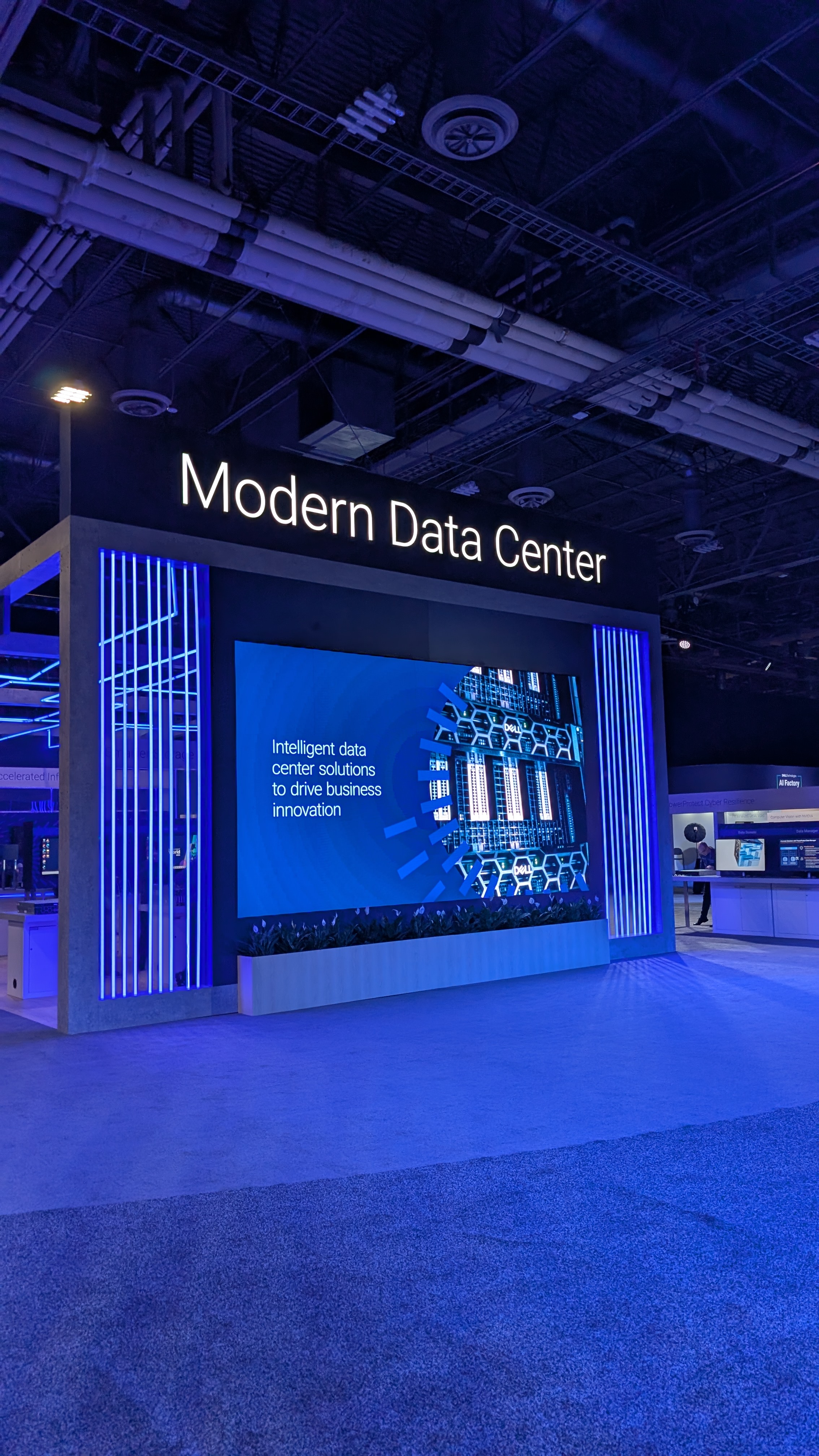
Up close and personal with the hardware on show
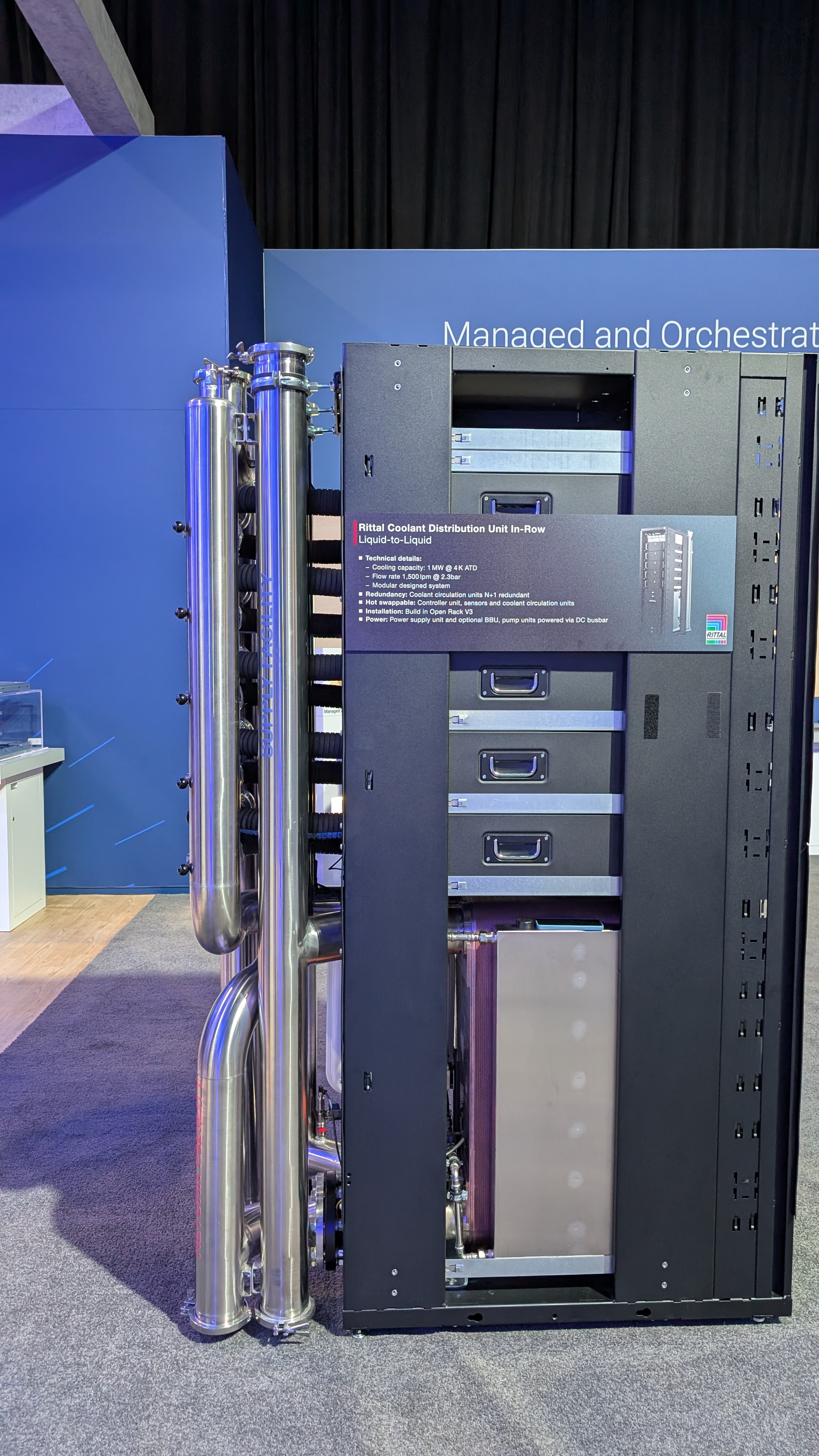
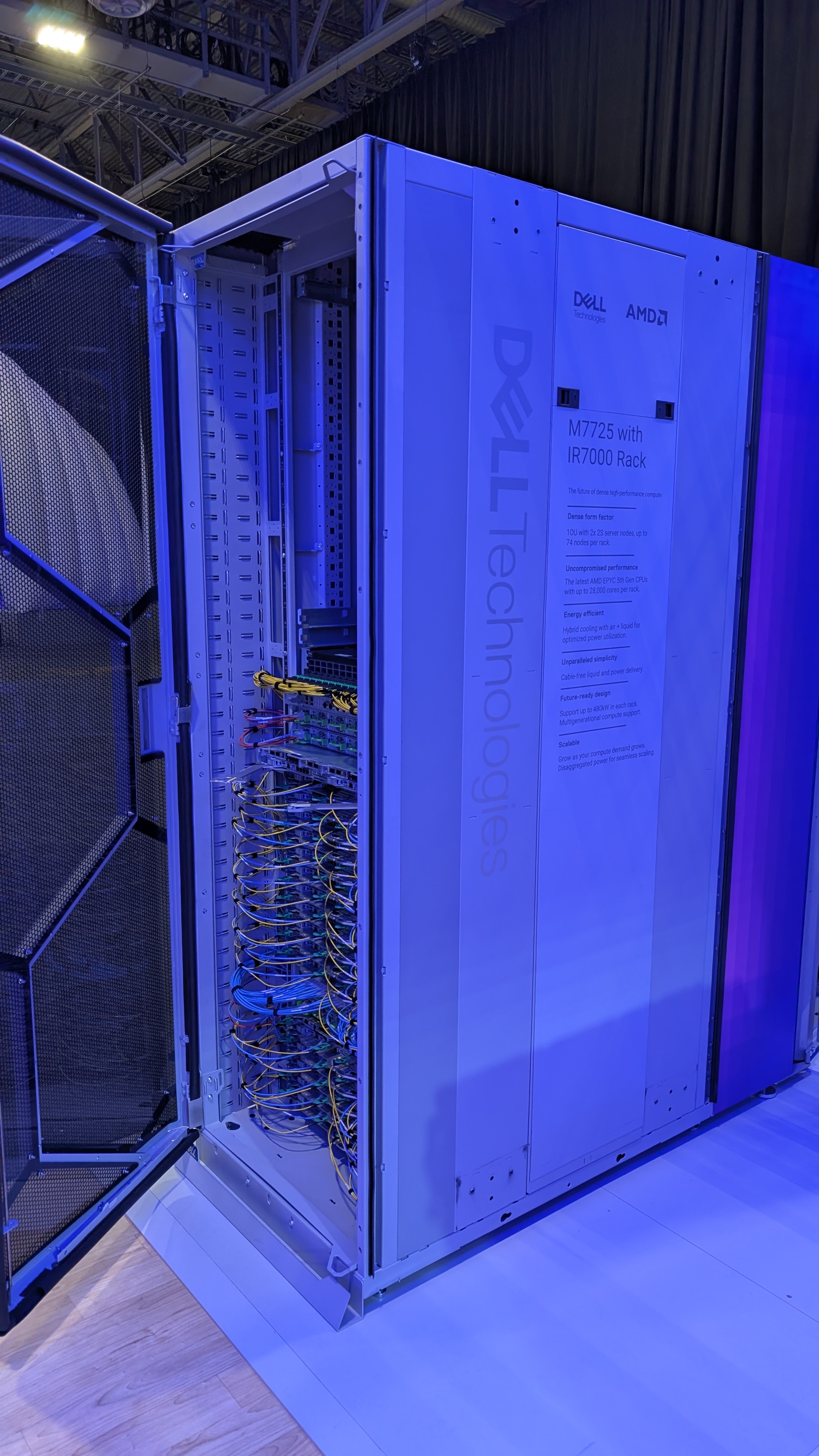
And that's a wrap on day two at Dell Technologies World!
We have more to come tomorrow, so we'll see you then for the final day.
Good morning from the final day of Dell Technologies World 2025!
We're off for breakfast before this morning's final keynote session - featuring Hollywood royalty Tom Hanks and Ron Howard, should be a great one!
We're in and seated for this morning's session, and luckily, some semblance of normality for this morning's pre-talk music, as the Vegas staple act of a classical quartet playing pop covers is here to serenade us....
It looks like Tom Hanks has brought a *very* special guest with him for this morning's session - let's hope it's not too heartbreaking a reunion...
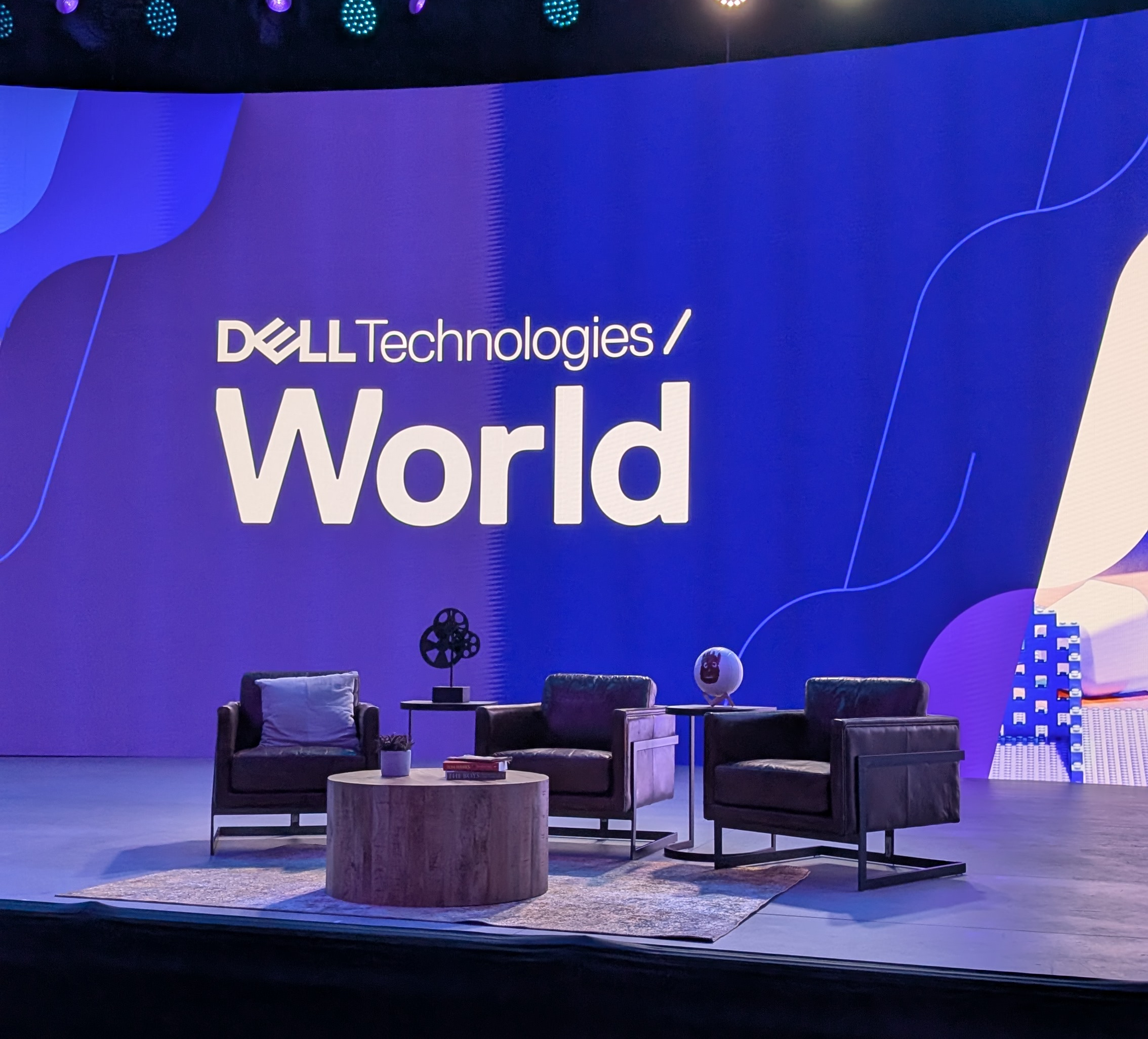
The string quartet is playing "You Got a Friend in Me" - not a dry eye in the house...
And for Ron Howard, we're now getting a rendition of the "Happy Days" theme (ask your parents).
Here we go - our host, Gerri Tunnell, Chief Marketing Officer, Dell Technologies, takes to the stage to introduce our guests.
Tom Hanks and Ron Howard!
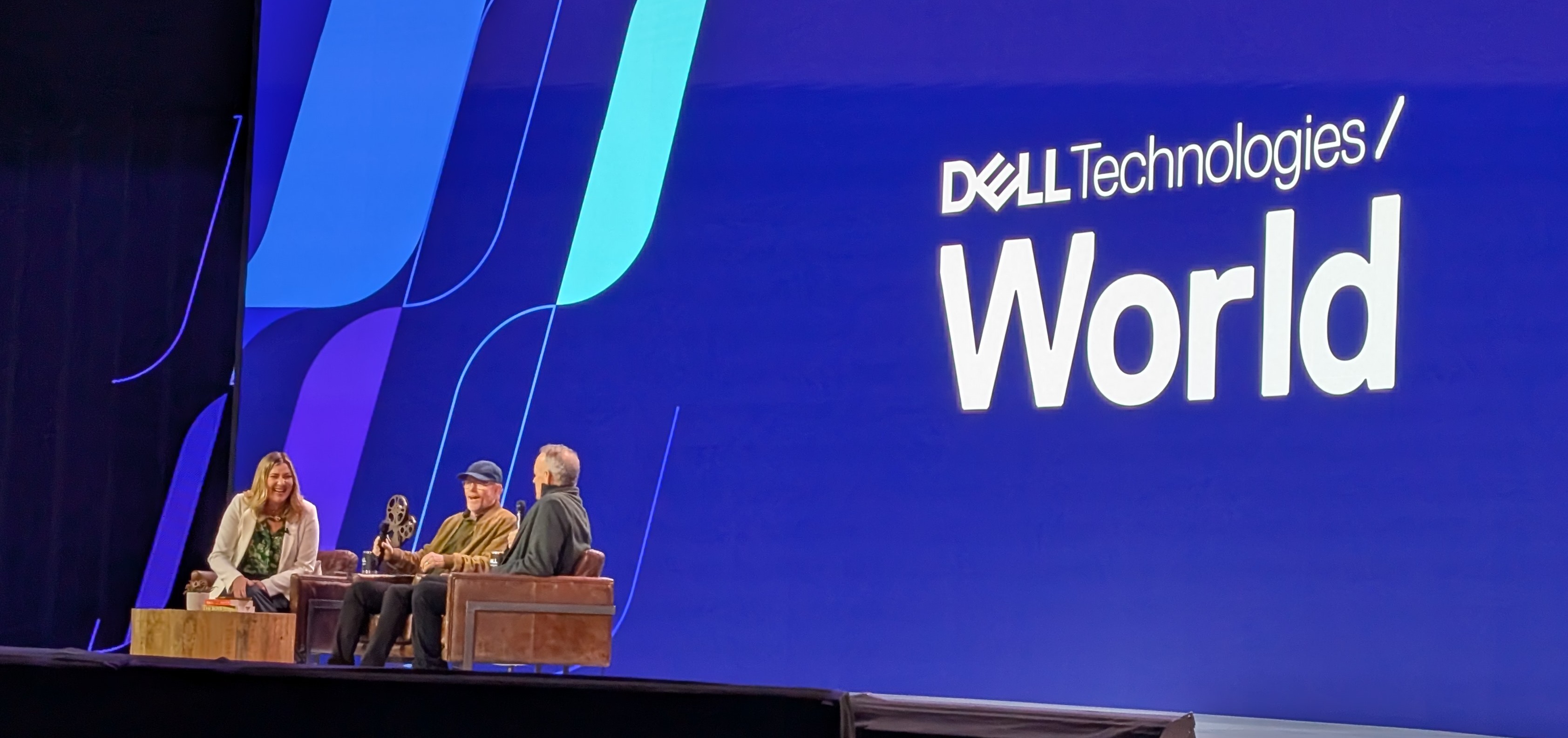
The two are straight into recollections about Splash!, their first project together, and Apollo 13, possibly their most famous collaboration.
They also mention their work on the Dan Brown series of films - Hanks recalls celebrating his birthday in the Louvre, and getting changed in front of the Mona Lisa...a different world hey.
The pair recall filming underwater in Splash!, and weightlessness in Apollo 13 - sequences which had to be done in a completely different technical space to today.
Hanks notes that filming such sequences would never be done today - CGI would take over, making things much safer and more cost-effective.
"The tools at our disposal now, as an actor - it's not quite as much fun standing in front of a blue screen, pretending you're in the Sistine Chapel, as actually going to the Sistine Chapel," Hanks laughs.
Hanks notes AI and ChatGPT aren't going to fully take over the filmmaking process, saying there will always need to be a human role present.
Howard recalls working with George Lucas on Willow, where CGI in a very primitive role was used for one of the first times.
"It's always about the audience - you need to tell them the story," Howard says - something using too much AI will affect - "those films benefit from the human fingerprint."
Hanks recalls the sequence in Forrest Gump where the lead character is super-imposed alongside world leaders - the audience knew it wasn't strictly accurate, but that helped the escapism.
Asked if technology has changed their creative process, Hanks notes his next project, filming in Australia, will be filmed entirely inside - so something is lost a little by not being in the environment, but the benefits are also there.
Hanks gives a shout-out to Adolescence, the Netflix hit show filmed in one shot in the UK.
Story is king, Howard notes - and characters are the vital point here, with his role as director being to create the environment.
AI can generate a lot of amazing things, Howard notes - and there's great value in that - but it is all about the spirit of the people who make the film, and the actors' dedication to their roles.
"It's exciting to use the tech, but we have to respond to our audience," Howard notes when asked about failing fast.
Asked about the effect of AI on future cinema - especially deepfakes and digital imaging, Hanks says there is a need for legislation, and suggest governments should be getting involved.
"You need to think, do I really own the copyright for me?" he asks.
Hanks mentions a movie he did which used de-aging for characters, noting it is "just another kind of make-up".
Howard predicts there may soon be another genre of films that are obviously deepfakes - much like specific studios such as Pixar have a consistent style.
Overall, Howard says the audience reaction will ultimately see what technology benefits future films.
Hanks notes that although ChatGPT or AI can generate film or TV ideas, whether they're any good or not is a completely different question!
Technology has always influenced story-telling, Howard notes - all the way back to caveman doing shadow theatre.
It's how we create the illusion that's vital, he laughs.
Hanks hails the "experiential economy" of going to watch a film - but how can this be developed or improved in the future?
He urges all of us to go experience movies in any format - so get going!
And that's a wrap! A fascinating and hilarious discussion all round - what a way to end our time at Dell Technologies World 2025.
Thanks for reading our live coverage of Dell Technologies World 2025! It's been a blast, so stay tuned to TechRadar Pro for more updates in the future.







